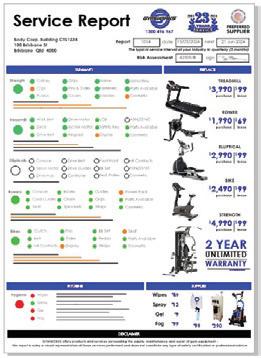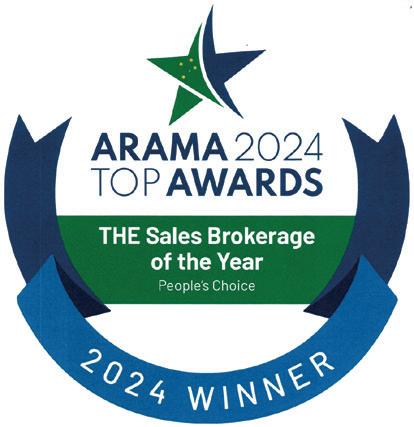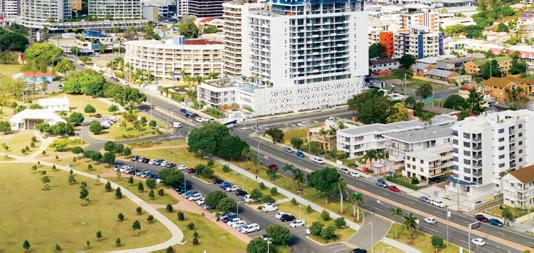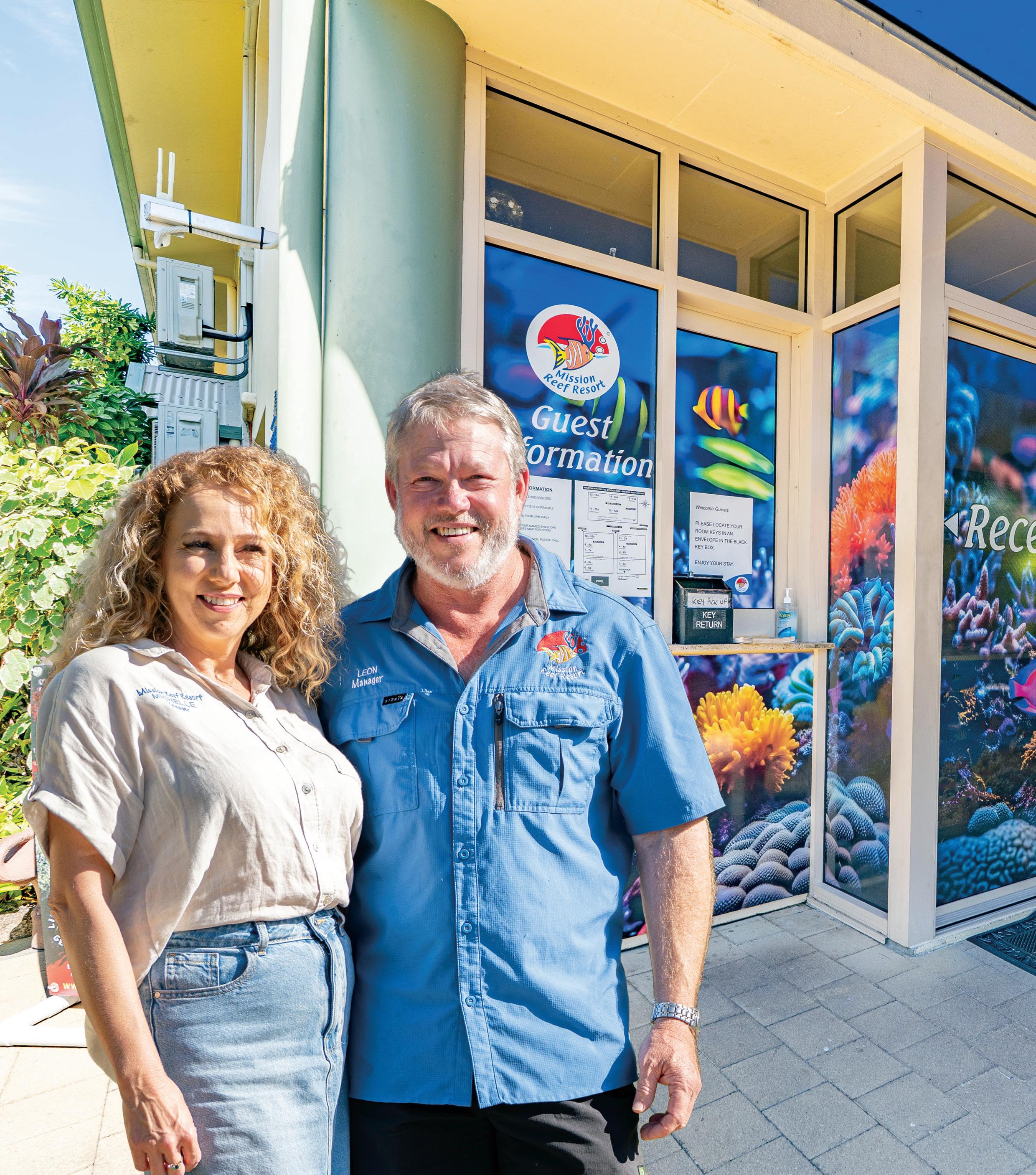






















Guest expectations are changing, the benefits of upgrading your buildings internet:
Tourism Impact: Discerning visitors now view fast and reliable internet as a key factor when choosing accommodation.
Online Reviews: Guest feedback increasingly reflects internet performance, which can influence future bookings.
Real Estate Appeal: Buyers and tenants are seeking homes that support remote work — high-speed internet is now essential.
Holiday Letting Performance: Buildings with excellent internet tend to enjoy be er reviews, stronger brand recognition, and increased occupancy and revenue.
What internet upgrade options should I choose?
Option A: New CAT cabling to each room. Improves speed over traditional lines but doesn’t support gigabit performance. Installation is costly.
Option B: Wireless distribution across the building. Cost-e ective but unreliable due to interference from building materials and layout.
Option C: Fibre optic cabling to each apartment.
O ers excellent performance but comes with high installation costs and device upgrade requirements.
Option D – Recommended: Gigabit fibre delivered via existing TV coaxial cables. This solution:
o Delivers speeds up to 1.5 Gbps (1,500 Mbps).
o Involves minimal disruption and cost.
o Is fully managed and warranted.
o Has proven success with existing installations.



…with the flick of a switch our internet services moved to world class Gigabit capable internet. Resident and guest satisfaction has skyrocketed with the availability of fast, reliable industry leading internet, which allows our resort to include phone, video and streaming services never before offered. Absolutely Brilliant!”






















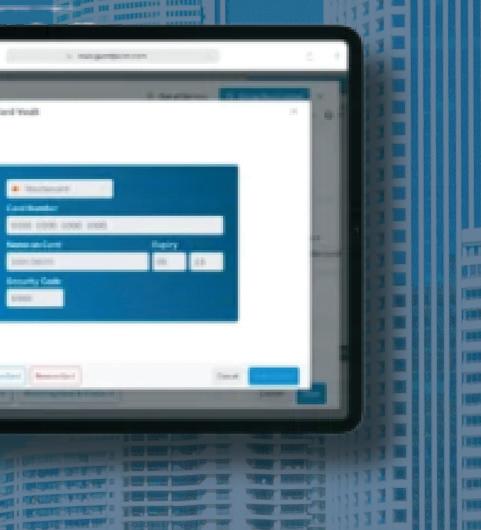































The views and images expressed in Resort News do not necessarily refl ect the views of the publisher. The information contained in Resort News is intended to act as a guide only, the publisher, authors and editors expressly disclaim all liability for the results of action taken or not taken on the basis of information contained herein. We recommend professional advice is sought before making important business decisions.





The publisher reserves the right to refuse to publish or to republish without any explanation for such action. The publisher, its employees and agents will endeavour to place and reproduce advertisements as requested but takes no responsibility for omission, delay, error in transmission, production defi ciency, alteration of misplacement. The advertiser must notify the publisher of any errors as soon as they appear, otherwise the publisher accepts no responsibility for republishing such advertisements. If advertising copy does not arrive by the copy deadline the publisher reserves the right to repeat existing material.
Any mention of a product, service or supplier in editorial is not indicative of any endorsement by the author, editor or publisher. Although the publisher, editor and authors do all they can to ensure accuracy in all editorial content, readers are advised to fact check for themselves, any opinion or statement made by a reporter, editor, columnist, contributor, interviewee, supplier or any other entity involved before making judgements or decisions based on the materials contained herein.
Resort News, its publisher, editor and staff, is not responsible for and does not accept liability for any damages, defamation or other consequences (including but not limited to revenue and/ or profi t loss) claimed to have occurred as the result of anything contained within this publication, to the extent permitt ed by law.




Advertisers and Advertising Agents warrant to the publisher that any advertising material placed is in no way an infringement of any copyright or other right and does not breach confi dence, is not defamatory, libellous or unlawful, does not slander title, does not contain anything obscene or indecent and does not infringe the Consumer Guarantees Act or other laws, regulations or statutes. Moreover, advertisers or advertising agents agree to indemnify the publisher and its agents against any claims, demands, proceedings, damages, costs including legal costs or other costs or expenses properly incurred, penalties, judgements, occasioned to the publisher in consequence of any breach of the above warranties. It is an infringement of copyright to reproduce in any way all or part of this publication without the writt en consent of the publisher.
2025 Multimedia Publications Pty Ltd
If there is one thing I have learned over the years, it is this: our industry is built on good stories. Whether you are an educator breaking down the “why,” an evaluator calling it like you see it, an advisor sharing what has worked for you or an entertainer making people smile, it all comes back to storytelling. It is what draws people in and makes a business feel more than just bricks and mortar.
I suppose that is why I am so passionate about it. My own story did not start in publishing, property or even hospitality. It began back in the UK in the 1980s when I was a nurse. Yes, big hair, shoulder pads and hospital wards that had barely evolved from the Nightingale era with back trolleys (if you know, you know), which were as much about sparking conversation and connection















Mandy Clarke, Editor editor@resortnews.com.au
as they were about patient care. Those back trolley chats could be awkward, but they taught me how to talk to anyone about anything.
Since then, I have been lucky enough to spend decades hearing



and sharing other people’s stories (thankfully minus the back trolley). I have met operators who have taken wild leaps of faith, suppliers who have dreamed up the impossible, business owners who have built an empire and managers who have, sometimes quite literally, kept entire communities afloat. Honestly, I could write a book… actually, given how many magazines I have produced over the past 20 years, I think I already have.
This is why I am so excited about NoVacancy 2025. For the first time, I will be hosting “Meet the Editor” sessions live at the expo. These will be easy, one-on-one chats where you can tell me what is happening in your business or just have a yarn about the industry. I promise no scary questions.
Closer to the event, you will be able to book a time through the NoVacancy app. Or swing by the new-look AccomNews/ AccomProperties/Resort
News stand to say hello and pick up a magazine.
In the meantime, I hope you enjoy this edition of Resort News. Our special report unpacks syndicates, how they are structured, who is getting involved, and the trends driving change.
We also catch up with Craig Johnson of Hotel Resort Sales to hear how he and wife and business partner Rebecca built their business, and we profile Mission Reef Resort in FNQ, welcoming new owners Michelle Mathews and Leon Piasecki who are brand new to the industry and already making waves. And remember to reach out to me directly if you would like to share your story in Resort News. Together, let’s keep this industry moving forward one great story at a time.
Warm regards, Mandy Clarke, Editor, Resort News













By Mandy Clarke, Editor
Syndicates have long played a role in management rights, allowing investors to team up and buy into bigger, more profitable businesses. But rising property prices, interest rates, tougher lending and operational pressures are reshaping how these deals work.
In this special report, we unpack how syndicates are being structured today, who’s gett ing involved, what properties they’re

targeting, and the trends driving change. Industry experts weigh in on the upsides, the pitfalls, and what it really takes to make a syndicate succeed beyond the paperwork.
At its core, a syndicate is a group of parties who pool financial resources to collectively purchase and operate the management and lett ing rights (MLR) of a residential or shortstay complex. One or more parties typically serve as the working partner, often living onsite and managing day-to-day operations, while others contribute capital and remain







Michael Philpott
in the background as silent investors.
Michael Philpott from MR Sales said syndicates allow multiple investors to combine their resources and expertise to acquire larger, more profi table ventures than they could aff ord alone.
He noted that this model can also benefi t owners’ corporations, particularly when it enables capable managers to take on larger complexes they otherwise couldn’t fund.
“When structured properly, these partnerships provide real value to the complex, the manager and the investors,” Michael said. “It is about creating a team with shared goals and measurable outcomes.”
While the concept isn’t new, the rising popularity of syndicates over the past two decades reflects shift ing market dynamics. Larger complexes require significant capital outlay, and syndicates provide a way to share both the cost and the opportunity. Some investors already familiar with the sector are drawn to its relative stability compared with other asset classes. Others are former operators or retirees looking for strong returns without daily involvement.



Tony Rossiter, principal at Holmans, said today’s syndicate structures are more refined than ever, att racting sophisticated investors who want to be involved in the sector without assuming operational responsibility.
“In my book, a syndicate is a buying group of three or more independent parties communing together with a common goal,” Tony said. “The appeal lies in allowing a talented working partner or couple to step into a larger business than they could otherwise aff ord, while silent partners—ideally with management rights experience—benefi t from the profi ts, enjoy a secure investment and only off er guidance when needed.”
Australia’s economic environment provides challenges for syndicate structures, especially around borrowing capacity, deal viability and financing costs. High interest rates have compressed returns and made it more difficult to fund highvalue acquisitions. Meanwhile, there are fewer suitable properties available that meet the size and income thresholds that syndicates typically target.
Tony said the impact of interest rates has been significant. Deals that would have stacked up a few years ago no longer meet investment return thresholds.
“Interest rates have had a big influence on syndicate activity,” he said. “As rates ease and returns improve, we will see more groups come back into the market.”
Another growing pressure point is the rising value of the manager’s unit. The real estate component can now add substantial capital requirements to a deal, aff ecting overall profi tability. While the manager’s residence is generally a required part of the MLR package, its increasing cost can erode returns if not carefully assessed.



Nathan Eades, national director at Ras360 Property Solutions, said syndicates must weigh the real estate cost against the business’s profi tability.
“When the real estate component of the package is disproportionately high, it aff ects the yield and often tips the deal out of balance,” Nathan said. “Syndicates must be careful to assess whether the business returns justify the overall purchase price.”
He added that some syndicates are now targeting business-only opportunities or looking to expand through bolt-on acquisitions to avoid overexposure to inflated real estate markets.
Michael Philpott noted that an increased presence of syndicates contributes to a more competitive landscape, particularly at the investor-grade level. He said rising demand has also pushed up multipliers.
“We’ve seen some of the larger complexes make multipliers of seven work, but only on select properties with significant upside,” he said.
“More competition has pushed up pricing, but it has also led to more professional and efficient management. That ultimately benefi ts everyone through better service and potentially higher property values.”
He added that while syndicates can involve up to 20 members, smaller, wellaligned groups often perform better.
The experts agree that the most successful syndicates are built around capable managers with proven track records, supported by investors who understand their roles and work together strategically.
The key ingredients for success include a strong working partner, aligned values and robust documentation. On the other hand, the biggest red flags are unclear boundaries, a lack of trust or personality clashes that turn partnership into conflict.
Tony Rossiter said that clear communication from the outset is crucial to prevent future disputes. He warns that even with good due diligence, harmony between partners is not guaranteed.
“If syndicate rules aren’t outlined from the get-go and expectations are not set, there can be challenges,” he said. “A partnership needs proper boundaries and harmony between the parties.
“Some personality types are just not suited to this model, so gett ing the right people involved from the start is everything.”

Paul Grant, a senior finance broker at Mike Phipps Finance, agrees that management quality can make or break a syndicate.
“The quality of the managing partner is absolutely critical,” he said.
“It is not just about finding someone who can do the job. They must be engaged, motivated and accountable to the investor group.”

Paul noted that most syndicates today involve a working partner who is also an investor, alongside silent partners with experience or exposure to the sector. He said syndicates allow high-quality operators who may not have the capital to buy a large asset to step in and add real value. However, he warned that this is not a liquid asset class. Selling out of a syndicate can be complicated, and investors need to be financially stable enough that they are not relying on returns to meet everyday expenses.






Trevor Rawnsley, CEO of ARAMA, echoed those sentiments and said that relationships sit at the heart of every successful syndicate.
“These arrangements should come with a health warning,” Trevor said. “Relationships matter—between partners, between the manager and investors, and with the body corporate. Issues often arise when a silent partner turns out not to be so silent or the managing partner underperforms. The operating manager must understand they are not the boss, but part of a wider team.”
He said consistent communication and clear, timely reporting are vital to maintaining trust, adding that a well-planned exit strategy should always be built into the agreement.
“A solid exit plan is essential,” he said. “It ensures people can leave cleanly and without conflict, just like in any well-run business.”
Despite the potential pitfalls, Trevor believes syndicates have enormous potential.
“They are a fantastic entry point for younger operators or those who lack the financial means to buy outright,” he said. “Good operators can build their careers and portfolios through syndicates. When done right, the upside outweighs the risks.”






John Mahoney, founding partner of Mahoneys, said syndicates can be an eff ective model, but only when relationships are clearly defined from the start.
“If the onsite manager is a minor investor doing all the handson work, while others enjoy the larger financial returns, that imbalance can cause friction,” he said. “To avoid resentment, there must be a clear structure, appropriate incentives, and mutual respect for each person’s role.”
John emphasised the importance of investor education and having realistic expectations.
“Syndicates are often sold on projected returns, but what happens when those returns don’t materialise?” he asked. “It could be due to interest rate changes, an unexpected event that reduces visitor numbers, a shrinking lett ing pool, or issues with management performance.”
He cautioned that even the most carefully structured arrangements are not immune to disputes.
“You can have a well-drafted legal agreement, but that alone won’t prevent conflict, especially when someone wants to exit the group.”
John also highlighted the risk of friction with unit owners, particularly concerning body corporate fees.
“There can be resentment from owners who question why they are paying levies while silent investors appear to profi t. That adds pressure to the onsite manager, who sits at the centre of these dynamics.”
Ultimately, he said syndicates demand more than just financial commitment; they require trust, transparency and thoughtful planning.
“Before investing, ask yourself if you’re comfortable placing your money into a business where success hinges on someone else’s ability to deliver,” he said.
Not all complexes are well suited to syndication. The experts agree that properties with net profi ts of $500,000 or more are ideal, particularly if they off er multiple income streams or opportunities to grow the lett ing pool. Complexes with strong agreements, minimal owneroccupier interference and reliable income are often targeted by syndicates looking for sustainable long-term returns.

Mark Ryall
Mark Ryall from Management Rights & Motel Finance PL said syndicates tend to pursue higher-value complexes, especially those with potential for renovation, improved lett ing or operational efficiencies. Furthermore, syndication off ers strong diversification potential.
Most experts agree there is growing interest in MLR as a stable, incomeproducing asset class, especially as investors seek alternatives to more volatile markets.
Mark Ryall said syndication models are becoming more sophisticated and scalable. Many investors are now participating in multiple syndicates, allowing them to spread risk, leverage buying power and share operational insights across a broader portfolio. This shift is leading to more collaborative, structured approaches, where best practices are shared and consistent standards are applied across multiple sites. He noted that this evolution not only benefi ts investors but also raises the bar for professional management in the sector.
“Syndicates are also embracing technology, with a growing number adopting techenabled platforms that support greater transparency, automated reporting and more efficient collaboration between investors and operators.”
He added: “Environmental, social and governance (ESG) principles are playing an increasingly important role too, with some groups focusing on sustainability, governance and community engagement as part of their long-term strategy.”
Paul Grant said he expects to see more existing syndicates expanding their


portfolios by acquiring add-on businesses, with business-only developments becoming increasingly att ractive to these groups. He also noted a growing trend of Self-Managed Superannuation Funds entering the sector, adding that nearly every finance enquiry from a syndicate now includes at least one SMSF investor.
“Negotiating finance for these deals is specialised but rewarding work,” he added.
Nathan Eades has seen fewer syndicates forming more recently, due to rising real estate values, higher multipliers
and tightening margins. He said deals today must off er strong profi tability and real potential for value-add.
“You’ve got to have enough fat in them to support the manager and cover costs,” he said. “It won’t work if it is all tied up in the real estate."
There can also be challenges to overcome. In one example shared by Nathan, the original managing partners of a syndicate wanted out.
The group managed to find a new operator who bought a 20 percent stake and proved so capable that the group went on to acquire several more buildings.
Nathan said: “When you match the right manager with experienced, supportive investors, the results can be outstanding.”
Syndicates off er a viable path into highvalue management rights, but they are not for everyone. Success requires more than pooled capital. It demands clear roles, aligned expectations, strong relationships, and careful planning.
While market conditions continue to shift , syndicates are likely to remain a valuable model, particularly for larger and more complex assets. However, caution is essential. When relationships break down, even the most detailed agreements can unravel. For those considering this path, the best move is to consult industry experts who have successfully structured these partnerships. Their guidance can help ensure the model works in real life, not just on paper.
Disclaimer: The information contained in this article is provided for general information purposes only and does not constitute financial or legal advice. Readers should not act on the basis of any material contained in this article without seeking independent professional advice that is tailored to their individual circumstances.













































































































































By Trevor Rawnsley, CEO, ARAMA
The 2025 ARAMA TOP Awards Presentation and Dinner at The Star Brisbane on September 12 is the night of nights for the management rights industry.
We can all learn from the best of the best in our business because they show us the way that eff ective management and administration can benefi t not only their schemes but the entire management and lett ing rights (MLR) industry.
I encourage everyone in the MLR world to attend the TOP Awards because it is a fabulous, inspiring night when we celebrate the success of those who set the example as the top performers in our industry.
The MLR industry is built on the extraordinary work of diligent managers providing outstanding service for their schemes.
The TOP Awards are the best way for the industry to recognise and reward outstanding performers. Their hard work and attention to detail save the owners in those schemes serious money and boost their profi ts, while at the same time making those schemes more harmonious places to live.
The ARAMA TOP Awards, sponsored by EBM Insurance & Risk, will comprise both

Images courtesy of ARAMA
We can all learn from the best of the best in our business
merit-based winners, judged by their peers drawn from leading industry figures, and our version of the Logies— the winners of popular votes whose achievements have been recognised by everyone they deal with.
This is the TOP Awards People’s Choice, sponsored by The Onsite Manager.
Last year’s gala event at Sea World Resort on the Gold Coast was a roaring success and a marvellous display of the great talent that makes the management and lett ing rights industry such a wonderful place to work, live and invest.
Maree and Ian Smith from the Hidden Vista group, just north of Brisbane, are record-breaking
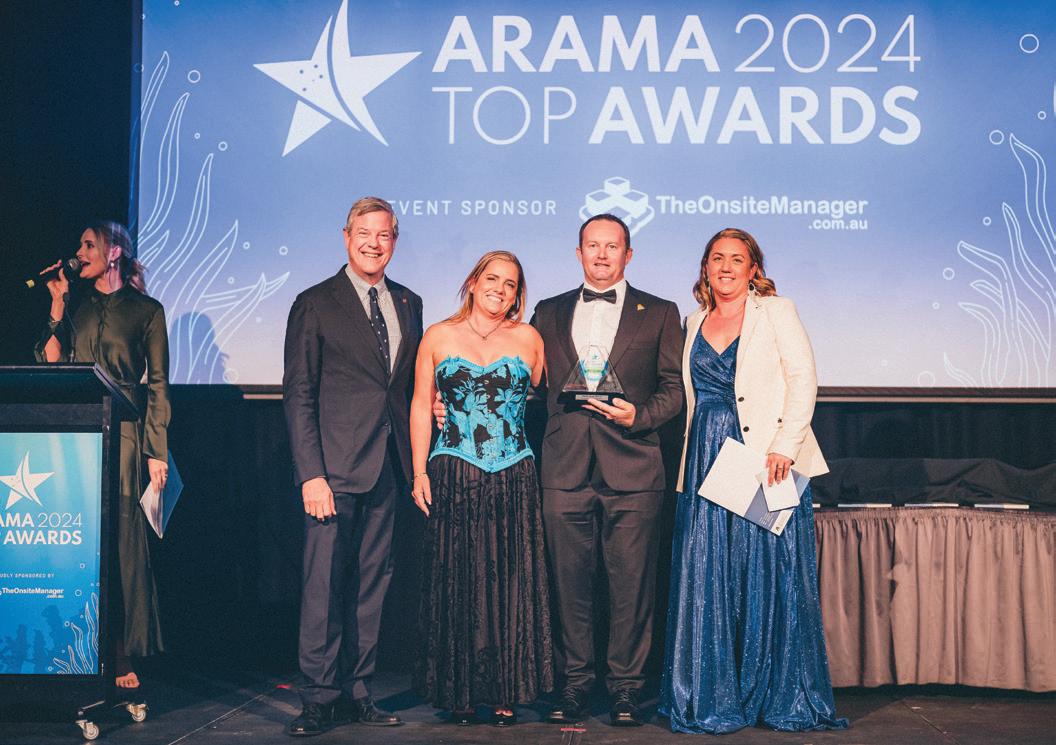
TOP Award winners who have set a high benchmark for all residential managers to follow. They took out the TOP Awards last year for both Resident Manager of the Year (Long Stay) and Building Manager of the Year, becoming the first threetime TOP Award winners, and then the first four-time winners.
Another great example of the best in management and lett ing rights came with last year’s winners of the newly created award for Resort Management Team of the Year.
Hamish and Jess Watt s from Glen Eden Beach Resort at Peregian Beach saved their complex more than $600,000 on a driveway project and, as a result, received a glowing endorsement from their strata treasurer and body corporate manager in the lead-up to last year’s TOP Awards.
The initial budget for the driveway renovation was $750,000. Through Hamish’s dogged persistence, all the work was carried out for $120,000. That’s what you call a TOP performance and a brilliant example of the benefi ts of management and lett ing rights to a scheme and to the wider accommodation industry.
For a similar doggedness in bringing improvements to their scheme, Stuart and Nicole Morris from Azure Sea Resort in Airlie Beach took out last year’s TOP Award for Resident Manager of the Year (Short Term Stay).
The property was their first venture into management rights. When Stuart and Nicole arrived at Azure Sea in December 2022, they had to hit the ground running, having taken over a resort that was quite rundown.
A lot of the gardens had no plants in them, and there were two pools that were literally falling apart, with small glass tiles constantly coming loose

and smashing on the ground to the horror of holiday guests.
Stuart and Nicole had never even owned a pool, let alone managed major repairs, but they raised $189,000 for the work.
They had to rely on the weather and coordinate contractors to complete the work between two school holiday periods to minimise disruption for guests.
In Airlie Beach, tradespeople are hard to find, but Stuart and Nicole organised two contractors who, even though they steadfastly refused to work weekends, managed to replace all the tiles within six weeks.
To save the scheme even more money, Nicole and Stuart also re-propagated all the gardens, creating new plants from cuttings so the body corporate wouldn’t be hit with extra expenses.
That’s TOP management, and their TOP Award serves as an example for managers everywhere—providing excellent service to their schemes and assisting in every way possible to improve life for owners and residents.
Paul Parrant, General Manager of the Oaks Port Douglas, who took out the TOP Award for Resident Manager of the Year (Mixed Stay) last year, showed
great tenacity and perseverance in applying for and fully utilising government grants and local council assistance in the wake of Severe Tropical Cyclone Jasper, the wettest tropical cyclone in Australian history.
Jasper devastated Far North Queensland with high winds and flooding, but Paul was a light out of the darkness for his scheme.
In a similar vein, Gary Baskin and his colleagues at the beautiful Oaks Sydney Goldsbrough Suites took out last year’s TOP Award for Building Management Team of the Year because they were relentless in improving their complex by enhancing its efficiency and sustainability, with reductions in energy consumption and operational costs.
This year’s finalists all offer amazing examples of effective management and are a great credit to the management and letting rights industry.
Nicole and Stuart Morris: Resident Managers of the Year–Short Stay Accommodation.
Maree and Ian Smith: Resident Managers of the Year–Long Stay Accommodation and Building Managers of the Year.

Paul Parrant of Oaks Port Douglas: Resident Manager of the Year–Mixed Accommodation.
Hamish and Jess Watts: Resort Management Team of the Year.
Gary Baskin of Oaks Goldsbrough Suites: Building Management Team of the Year.
Jessie Shi of Resort Brokers: Sales Broker of the Year.
Bobo Qi and Darren Brent of Property Bridge: Sales Brokerage Firm of the Year.
Mike O’Farrell of MLR Services: Service Provider of the Year.
Shay Harrison: The Onsite Manager of the Year.
Will they win again, or will 2025 usher in a new group of outstanding performers?
Let’s all get behind our industry’s big celebration.
Special VIP guests will be at the TOP Awards, including industry legends and political leaders.
Not only will the gala event be a fantastic night of terrific food, drinks, great company and wonderful entertainment, but each award winner and nominee has something to teach us all about making our industry stronger and more successful.
Tickets can be purchased individually or as a block of eight for a full table. It really is a TOP event.












By Ben Ashworth, Senior Associate, Small Myers Hughes Lawyers
This month I am encouraging all building managers who operate a letting business to do a quick health check on how they handle GST on room tariff s and rent charged to guests and tenants.
In the ordinary course of a standard lett ing business, individual owners (who aren’t in the business of supplying commercial residences) appoint the building manager as their lett ing agent to let out their lot on their behalf.
This is an agency relationship, and although the building manager operates a business, the supply of the lot is actually being provided by the owners (not the building manager), and that supply is the supply of a residential premises, which is not subject to GST. The key factor here is that the building manager doesn’t control the use of the lot. The building manager is merely acting as an agent and helping the owner of the lot (who has control of the lot) to supply the use of the lot to guests and tenants.
Salesperson | Property Manager | Real Estate Agent | Resident Letting Agent
• Traineeships
• Small face to face classes
• Live Zoom classes
• Delivered in English and Mandarin
• Flexi Learning at own pace
• Recognition of Prior Learning
• Friendly, Experienced Trainers
• Practical Courses for MR Industry
• Qualifications issued promptly
• Competitively Priced
• Exclusive Online Support Group
10 percent of every dollar of income you have generated when letting out a lot you control could be a tax bill waiting to be paid
Sometimes, instead of being appointed as the lett ing agent for an owner, the building manager might enter into a lease with the owner so that the building manager has full control of the use of the owner’s lot. This is commonly referred to as a leaseback arrangement. In this scenario, instead of paying the owner the profi t earned from lett ing out the lot on behalf of the owner, the building manager will pay the owner rent to use the lot. The amount of rent paid will depend on the terms of the lease the building manager enters into with the owner. Sometimes the rent might be linked to the amount the room is used and the profi t it generates, but just as easily, it can also be a fi xed amount agreed with the owner and have no relevance to how much income the lot generates for the building manager.
When a building manager lets out a lot that they have leased or control, the supply of the lot is unlikely to be the supply of a residential premises that is not subject to GST. When a building manager lets out a lot they control (either because they have leased the lot or because they own the lot), it is likely that the rent or room tariff they charge to guests should include GST. This is because the supply of the lot likely now has the characteristics of a supply by a person in
the business of supplying commercial residences.
Things to watch out for:
• Do you let out a lot you own?
• Do you let out a lot you lease?
• If you answered “yes” to either of the above, do you charge GST when you let that lot out?
If the last question applied to you and you answered “no,” there is a reasonable chance that you should be charging GST, and I strongly recommend you seek advice from your accountant and your lawyer. If you have failed to collect and pay GST for a lot, the amount of GST you could be required to pay will backdate all the way to the first time you failed to collect and pay the GST that is owed. In simple terms, 10 percent of every dollar of income you have generated when lett ing out a lot you control could be a tax bill waiting to be paid.
This is not something you want sneaking up on you out of the blue.
Liability limited by a scheme approved under Professional Standards Legislation.
Disclaimer – This article is provided for information purposes only and should not be regarded as legal advice.
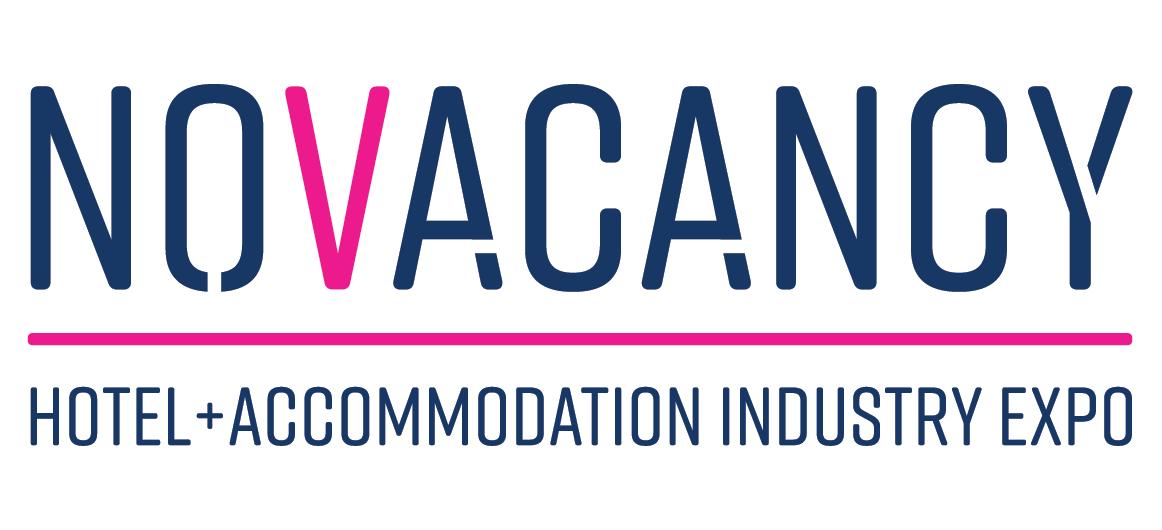
17 - 18 SEPTEMBER 2025






































































By
New seller disclosure requirements commenced on August 1, 2025. As part of this new seller disclosure scheme, disclosure of a Community Management Statement (CMS) and the introduction of the Body Corporate Certificate (BCC) will help ensure buyers of lots in community titles schemes (CTS) are fully informed before their purchase.
The heralded improvements are expected to enhance transparency, consistency and efficiency within Queensland’s community titles sector.
The body corporate plays an important role in the new seller disclosure scheme, as it will be required to provide the seller with a body corporate certificate when requested.
The seller disclosure framework benefits buyers, sellers and industry professionals through clearer disclosure and reduced confusion in property transactions.
To assist with explaining the changes, this article will explore what a CTS and CMS are. It will also provide information about the changes to seller disclosure requirements that impact the community titles sector and what must be disclosed.
This will assist sellers and bodies corporate to prepare for the changes, and help buyers of a CTS lot understand the information they are legally required to receive in order to make an informed choice.
CTS are usually apartment buildings or townhouse complexes where each owner holds a portion (called a lot) and shares ownership of common property such as gardens, foyers and swimming pools. A CTS must contain a minimum of two lots and common property.
All owners of lots in a CTS are part of the legal entity called the body corporate. The body corporate is responsible for the running of the CTS, making decisions, setting annual fees to maintain the common property, finance administration services and obtaining insurance.
When a CTS is created, the developer must register a Community Management Statement (CMS) with Titles

Queensland. The document confirms the name of the body corporate and the regulation module that applies. The regulation module determines how most body corporate decisions are made.
In addition, the CMS includes two schedules of lot entitlements: the Interest Schedule Lot Entitlements and the Contribution Schedule Lot Entitlements.
These schedules determine how the running costs for the administration, maintenance and insurance of common property, and the cost of utility services such as water and electricity, are shared between lot owners.
The CMS also usually contains the registered by-laws, including any that grant exclusive use to lots within the scheme.
Seller disclosures in a CTS are crucial for buyers to make informed decisions and understand their role and responsibilities once they become a member of a body corporate.
Owning in a CTS is very different from owning a stand-alone property. It is important that buyers are aware of these differences before they purchase.
Providing a buyer with all relevant information, such as their financial and legal responsibilities, before purchasing a CTS lot may help prevent future disputes and misunderstandings.
Each CTS has its own by-laws, such as restrictions on pets, renovations, noise levels or the use of shared spaces. Buyers should familiarise themselves with these rules to ensure the property aligns with their lifestyle preferences.
The new seller disclosure scheme only applies to sales of existing lots, not sales of proposed (off-the-plan) lots.
With limited exceptions, the seller of a property in Queensland is now required to give a buyer a seller disclosure statement, as well as other prescribed certificates applicable to the property, before the contract for the sale of a lot is signed by the buyer.
The prescribed certificates for a lot in a community titles scheme include the CMS and a body corporate certificate.
The new seller disclosure requirements replace the previous requirement for the seller of a CTS property to disclose certain information under section 206 of the BCCM Act. It also replaces the existing body corporate information certificate that buyers could obtain from a body corporate under section 205 of the BCCM Act.
The existing requirements in Chapter 5, Part 2 of the BCCM Act regarding disclosure for proposed (off-the-plan) lot sales in community titles schemes continue to apply.
A new Seller Disclosure Statement (Form 2) has been introduced.
The statement gives details of the lot being sold, including titling information such as the address and plan description.
Importantly, Part 6 of the Seller Disclosure Statement alerts buyers that the lot they are buying is part of a CTS.
Sellers of properties within a CTS must also provide the CMS to a buyer. The CMS can be obtained from Titles Queensland. A copy may also be available from the body corporate records.
Sellers of properties within a CTS must also provide a BCC to a buyer. The seller must obtain the
BCC from the body corporate (or their agent) via a written request and with payment of a fee.
The Body Corporate Certificate contains both general information about owning a lot in a CTS, as well as specific information about the CTS and the lot being purchased, such as administrative and sinking fund contributions and insurance held.
A buyer may still wish to inspect body corporate records for important information not included in the BCC, such as physical defects in the common property, body corporate expenses for which levies have not yet been fixed, body corporate disputes and matters raised at recent body corporate meetings.
If the seller is unable to obtain a BCC from the body corporate, for example if records have been lost or are in disarray, the seller must provide a statement explaining why the certificate cannot be given.
A buyer, or their solicitor, may also ask the body corporate for an updated BCC prior to settlement to confirm any amounts owing.
The body corporate must provide a body corporate certificate for a lot in the approved form within five business days of a written request accompanied by the fee.
There are two approved forms for the Body Corporate Certificate:
• Body Corporate Certificate: BCCM Form 33
• Body Corporate Certificate (Two-lot Schemes): BCCM Form 34
The required information for the Body Corporate Certificate should be available within the body corporate records in most cases. It is important for a body corporate to keep up-to-date records to enable easier completion of the BCC.
Bodies corporate should maintain the required certificate information and documents on hand, as these usually only need updating if changes occur.
For example, a BCC must include information about the scheme’s by-laws. Usually, the scheme’s by-laws are listed in the CMS. However, some older schemes refer to by-laws as of July 13, 2000.
If that is the case, a consolidated set of by-laws must be provided with the BCC. If the body corporate has not maintained a consolidated set, a search of Titles Queensland records may be needed to ensure the most current by-laws are given. This consolidated list can then be kept on hand for future disclosures.
A list of the documents required to be given with the BCC is on page 11 of the BCC (or page 9 for the Two-lot Schemes BCC).
While long-term benefits include improved efficiency, there may be an initial workload increase for bodies corporate in:
• understanding the information to be included in the certificate and identifying it in the records;
• updating internal systems and processes; and
• responding to early questions or issues.
Over time, the BCC may reduce enquiries from buyers by addressing common questions usually asked during the sale of a CTS property.
The fee for the body corporate certificate is $84.10. If the person requesting the certificate has requested one for the same lot within the past three months, a reduced fee of $71.50 applies.
An additional fee of $30 is payable if a certificate is requested within 24 hours. This must be refunded if the certificate is not provided within that time.
For bodies corporate, the shift brings both opportunities and responsibilities.
While there may be an initial adjustment period involving new administrative practices, the long-term gains are substantial. These include better compliance with legal requirements, improved recordkeeping and more professional governance standards.
Ultimately, seller disclosure and the BCC strengthen the integrity of CTS throughout Queensland and provide a clearer, more accountable foundation for community living and property ownership.









By Mandy Clarke, Editor
Some people ride out a storm; others turn it into an opportunity.
When COVID-19 shut down the world, Craig and Rebecca Johnson, partners in life and business, didn’t sit tight and wait. They pivoted. Drawing on years of experience and relationships in the tourism space, they created a new venture: Hotel Resort Sales.
This boutique brokerage is already making waves in the management rights world, with a string of successful sales and a reputation for reliable, relationship-based service. In this interview, Craig shares how it all began, what keeps him motivated, and the lessons he has learned along the way.
You’ve called the Gold Coast home since 1995. What originally brought you here, and what made you stay?
Born and raised in Melbourne, I made the move to the Gold Coast when I was 22. I’d just finished my marketing degree at Swinburne when I landed a role in the tourism sector, working for Accor, which is where I met my wife and also my business partner, Rebecca.
The Gold Coast has been home to our family since then and has given us so many great friends, a good life and a strong sense of community. We feel incredibly grateful to call it home.
Before you launched Hotel Resort Sales, you and Rebecca ran a tourism business?
Yes, in 2014, we acquired T.H.E. Brochure Service / MiGoldCoast. We own and service more than 220 brochure boards throughout Gold Coast hotels and accommodation houses, providing local tourism
operators with a way to promote their businesses directly to visitors. Over the past 11 years, we have successfully expanded our business, built a strong presence in the local tourism industry and forged strong relationships with management rights owners.
Then, in March 2020, COVID hit. Like many others, our tourism business was heavily impacted. But what initially seemed like a major setback soon became an opportunity to pivot.
One day, I was dropping by a resort when the owner threw a business card at me and asked if I knew the person trying to sell their management rights. I didn’t, and he said, “Why don’t you do it? You already know everyone in this industry.”
So, I did my real estate training while everything was on pause. That chance moment led to a new career path.
How did mentorship play a role in your early days?
I was finishing my real estate licence when I was introduced to David Rotheram. We caught up for coff ee and clicked. He became an exceptional mentor, and in the following three years, I gained a wealth of knowledge from an expert who had spent more than two decades in management rights sales. I was very privileged to be guided by David during that time, and I’m forever grateful for the advice and direction he provided.
I recall those early sales, and they weren’t easy. The first few contracts were full of challenges, but every obstacle helped sharpen my skills and shape me into a better agent.
When David decided to retire, Rebecca and I seized the opportunity and launched Hotel Resort Sales in April 2024.
How did your background in tourism help you build trust as a broker?
People already knew me, I had built solid relationships with Gold Coast management rights owners and operators for more than 11 years. Our work ethic and consistent presence had fostered a strong foundation of trust and mutual respect.
For those unfamiliar with management rights, how do you explain the concept?
Broadly speaking, it’s a business model where you manage a residential or holiday complex. You often live onsite
and earn income through caretaking and lett ing duties. There’s a salary from the body corporate and additional income from managing rental units. It provides a solid return on investment and the chance to grow as demand increases. In Queensland, it works well because of rising property values, tourism and rental demand.
What advice would you give to a first-time management rights buyer?
Educate yourself. Speak to a management rights broker who is committed to explaining all
available options. Discuss with a management rights specialist finance broker who can help assess your borrowing capacity. That will enable the broker to identify management rights businesses for sale that align with your financial capacity and specific requirements.
What’s one sale you’re particularly proud of?
One of the most rewarding is among my recent sales. Over these past few months, Rebecca and I were able to secure Meriton’s first-ever purchase of management rights in Queensland in a landmark deal involving three high-rise inner-city Brisbane complexes. There were challenges and complexities along the way, but it was extremely satisfying to obtain a result favourable to both the buyer and seller. Fortunately, this has opened the door to further opportunities.
Are you noticing any trends in buyer interest or seller behaviour?
Yes. Businesses with strong net profi ts and plenty of years left on agreements are selling
quickly. It’s a good reminder for sellers to pay particular attention to achieving top-ups along the way.
Permanent complexes with flexible office hours are also in high demand.
On the buyer side, we’re seeing more baby boomers relocating to Queensland for the lifestyle and weather, and consortiums forming partnerships to purchase larger, higher-value complexes.
What does success look like for an operator in today’s market?
A successful management rights operator in today’s market is proactive, serviceoriented and adaptable. They build strong relationships with owners, the body corporate committee and guests. They maintain high standards of property presentation and communication.
Most importantly, they run the business with a handson approach, prioritising customer service and building long-term success through reliability and trust.
Our work ethic and consistent presence had fostered a strong foundation of trust and mutual respect.
How does living on the northern Gold Coast influence the way you work?
It’s all about finding balance. When possible, we like to start the day with a morning walk at Paradise Point, using the time to talk through our plans and priorities for the day. We make the most of the quieter periods to recharge, knowing that during busy times, we often work after hours and on weekends to keep everything running smoothly.
What do you like to do outside of work?
Rebecca and I are known to be prett y social, so catching up with friends for a bite or some drinks is high on the agenda. Our son is an AFL football player so our weekends include watching his footy match.
Who or what inspires you most?
Happiness starts at home and creating an environment where those around me can also thrive is incredibly important. We’re fortunate to have a joyful family life and strong friendships, and that positive energy naturally carries over into our business relationships.
What’s the best advice you’ve ever received?
We have one life that we are aware of, so make each day count! Be happy, be kind, be grateful, stay humble.
What drives you to go above and beyond for clients?
At Hotel Resort Sales, our brand promise is clear: “Personalised Service Exceeding Your Expectations.”
What truly motivates me as an agent is that defining moment—after countless inspections, conversations, and careful deliberation—when a buyer walks into a property and simply says, “This is the one.”
It's more than just meeting a checklist; it's about helping them find the right business, the right lifestyle, and the right future. Being part of that moment of certainty and connection is what makes this job so rewarding.
Equally fulfilling is delivering a standout off er to my
vendor—one that gives them the outcome they’ve been working toward. Helping a client successfully transition to their next chapter is the ultimate professional achievement.
Where do you think the management rights industry is heading?
It’s growing, especially here





Craig and Rebecca Johnson
in Queensland. More people want a business that blends lifestyle with income. Living where you work is a big draw card for people moving up from the southern states, or for those wanting a career change.
Are there any exciting listings or new directions you’re working on that you can share a hint about?
At Hotel Resort Sales, we regularly secure off-market listings that aren’t always advertised online. Many of these opportunities are sold before ever hitt ing the open market, making it a great time to connect with us if you're looking to buy or sell.
If you could swap jobs for a day, what would it be?
I’d love to work in a pool bar in the Greek Islands. Sunshine, stunning views, relaxed vibes, and meeting people from all over the world, it sounds like the perfect mix of fun and escapism for a day.
What’s your guilty pleasure after a long day?
A good Netflix binge. We like a good Aussie series.
What’s something people might be surprised to learn about you?
I’m hopeless when it comes to using a computer. That’s where Rebecca and I make a perfect team. She’s a marketing, computing and sales expert, and as she often reminds me, she’s also the boss!
With more than $46 million in contracts currently underway this financial year, Craig and Rebecca’s journey is proof that hard work, loyalty and genuine care for people never go out of style. Their fresh approach and long-standing relationships are bringing new energy to the management rights sector, and it’s making a real diff erence.

Even the most professionally run accommodation providers encounter the occasional negative guest experience. But what makes the difference isn’t perfection—it’s timing.
One overlooked housekeeping request, a faulty appliance or a noisy neighbour can overshadow even the best eff orts. Too often, managers only become aware of an issue after the guest has checked out—when frustration is posted online. By then, it’s too late to turn things around and future bookings can be aff ected.
Now, imagine being alerted to that same issue in real time—while the guest is still on your premises. The outcome could be entirely diff erent. If you’re notified early, a problem resolved is no problem at all.
Forward-thinking operators are now embracing a real-time guest feedback platform called Pulsi—a mobile-first innovation that lets managers hear from guests before they leave.
At Pulsi’s core is the Guest Pulse—an engaging microsurvey created by you, which guests can access with a single tap on their mobile device. No app, no log-in, no personal details required. Pulsi gives you real-time feedback that is engaging, secure, costeff ective and fast. Better yet, there’s no limit to the number of Guest Pulses you can create.
So, whether it’s a quick “How’s your room?” SMS after checkin or a beacon in the room that makes it easy to report

maintenance issues, Pulsi helps you stay connected, responsive and proactive.
Pulsi removes the barriers to giving feedback by making it fast and frictionless. Because guests can share their thoughts in the moment—from their own device—you’ll receive more insights. This means you hear not just what needs improving but also morale-boosting praise for your team’s great work.
And more responses mean more chances to fi x problems before they aff ect reviews or overall guest satisfaction.
With patented beacons placed in guest rooms or common areas, guests can simply tap their phones to share their opinion. Beacons are highly durable, customisable to your brand, and require no power source.
Combined with the ability to send Guest Pulses via SMS, MMS, QR codes in emails or on printed materials, or weblinks
in your social channels and digital companions, Pulsi off ers complete flexibility.
The only thing Pulsi doesn’t off er? Paper forms and post-stay emails that too often go unanswered.
Pulses are created and feedback is displayed in one easy-to-use online dashboard, accessible by multiple users via desktop or mobile.
For issues that can’t wait, Pulsi sends alerts to key team members via SMS or email. A late-night noise complaint, for example, can go straight to the night manager, while daytime issues can be directed to reception or housekeeping.
This responsiveness not only prevents complaints—it turns potential negatives into standout service moments.
Pulsi adapts to properties of all sizes and types. You can:
• Set up multiple managers and platform administrators.
• Manage single or multiple properties from one dashboard.
• Send response-driven alerts directly to the relevant staff according to shift patterns.
• Automatically deploy diff erent Pulses based on the day, time or guest location.
• Whether you run a boutique hotel or a large multi-site business, Pulsi fi ts your setup.
Get started with Pulsi from just $30 per month. For that small cost, you gain real-time guest insights, improved staff morale, better reviews and stronger rebooking rates.
The impact is measurable: According to Travel Pulse, guests will pay 24 percent more for a hotel rated 3.9 stars over one rated 2.4—and 35 percent more for a 4.4-star property over a 3.9. Pulsi helps you get there by improving service when it matters most.
With Pulsi, it’s easy to get started. Log in, create your first Pulse in less than a minute and start collecting real-time feedback.
Pulsi is currently off ering a commitment-free, one-month trial at pulsi.co. Or, to learn more about Pulsi and how it can help your business, contact Pulsi directly at info@pulsi.co.




Don’t wait until you see a damaging review online. Know about issues as they happen, so you can resolve them immediately, improve guest satisfaction and increase future bookings.
Designed for a mobile first world, Pulsi is the fast, easy, and engaging way for guests to reply digitally without any app or download.































By John Mahoney, Partner, Mahoneys
This is the second of two articles about the rights of holiday and short-term guests—and of managers. Whilst the first part focused on the contractual aspects of these rights, this part will explore how a manager can deal with problem guests.
As pointed out in Part 1, a contract for short-term accommodation does not have to be in writing to be enforceable. Where there is nothing in writing, or where the contractual conditions (such as those in any registration document the guest signs or accepts) are deficient, conditions needed to give the arrangement business effectiveness will be implied.
Part 1 set out, from a guest's perspective, what those implied conditions would be. From a manager's perspective, particularly in relation to troublesome guests, these would include:
• The guest must comply with the manager's reasonable directions.
• The manager has the right to inspect the unit, with or without notice, in the event they consider the conditions of stay are being breached.

This part will explore how a manager can deal with problem guests
• If a guest is in serious breach of any actual or implied conditions of stay, or fails to remedy a breach after reasonable notice, the manager may terminate the arrangement and take reasonable steps to enforce eviction.
• If a guest creates a nuisance to other occupants of the complex and refuses to leave, the manager may use such reasonable force as is necessary to remove the guest.
If a guest is in breach of the by-laws or the actual or implied conditions of stay, I recommend the following actions:
1. If the breach is relatively minor and can be remedied, such as holding a party or exceeding the number of permitted guests in the unit, give notice (verbal is sufficient) and allow a reasonable time for the breach to be remedied before taking further action. How much time is reasonable will depend on the circumstances.
2. If the breach is one that cannot be remedied, such as destruction of property, take immediate action.
3. In taking such action:
• Do as much as you can without involving the police.
• If physical force must be used to remove or restrain a person, involve the police.
Illegal activity (e.g. drugs, prostitution or other illegal activities)
• In the case of suspicion, investigate. You have a right to enter and view, even if the unit is unoccupied. Do not search—simply observe.
• If criminal activity is confirmed, involve the police immediately.
• If the activity is something like prostitution, ask the guest to leave. If they refuse, involve the police.
Antisocial behaviour
• If there are unauthorised visitors, or if there is excessive noise or nuisance,
give one warning.
• If they fail to comply, demand that visitors leave. If they refuse, or if the noise continues, involve the police.
• You would generally not involve security staff to remove people; they should supervise only.
• Physical removal should be left to the police. However, you still retain the implied rights referred to above.
By-law breaches
• Follow the same procedure as above: warning, followed by demand to leave, followed by involving police if necessary.
Damage or destruction of property
• View damage at your discretion.
• If not serious, require the guest to pay or indicate you will charge their credit card.
• If the damage is serious, ask the guest to leave and/or pay, or charge the credit card.
• If the guest refuses to leave, involve police. Note: police may not intervene in monetary disputes but may act in cases of wilful property destruction.
Refusal to check out
• If the guest is not present, you may enter, remove belongings and store them with reasonable care. You are at liberty to cancel remote entry access or take other steps to deny re-entry.
• If the guest is still present, it is permissible to remove their goods.
• If physical removal is needed, involve the police.
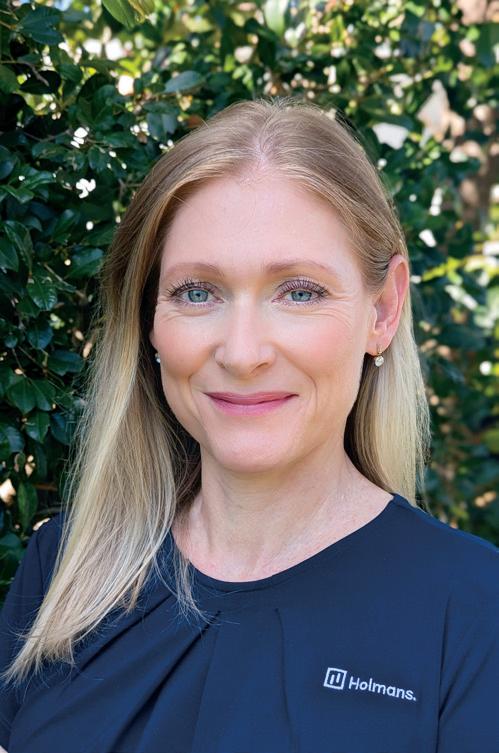
By Julie Jacobson, Senior Accountant, Holmans
As part of the Holmans Management Rights and Accommodation Industry team, I’m grateful to be able to share insights and information relevant to this dynamic sector that plays a vital role in the economic and community fabric of our region. In this issue, I’d like to take the opportunity to introduce myself.
As a Noosa native, I grew up amongst the resorts and holiday accommodations in a family that developed a number of unit complexes and residential subdivisions in the area. I still
remember cleaning units and planting and watering gardens and turf after school and on weekends. So, you could say I have an early association with the industry and caretaking.
As a Senior Accountant at Holmans, I’ve spent the past year deeply immersed in the world of management rights and accommodation. While my current role is relatively new, my connection stretches back further, having gained familiarity with the sector in an earlier stint with Holmans before spending a decade overseas and returning in a senior capacity.
After completing Bachelor of Commerce and Bachelor of Business Management degrees at the University of Queensland, my professional journey has taken me through diverse roles: from the property space as an accountant for a small development business, to public practice tax accountant, and then into the international education sector as financial controller in a large not-forprofi t in the United States. These experiences have given me a broad lens through which to understand complex financial environments, as well as a practical, solutionsfocused mindset—something that translates well in an industry as varied and handson as management rights.
Over the past year, I’ve worked
closely with clients across holiday, permanent and mixeduse property types. Whether it’s financial verifications, preparing profi t and loss statements for business sales, or developing projections for off-the-plan developments, I aim to bring clarity, accuracy and confidence to every transaction. I’ve also provided business benchmarking services, helping clients understand how they stack up and where improvements can be made.
One of the things I find most rewarding about working in the management rights space is the personal nature of the work. No two properties or client situations are alike. Helping clients navigate the complexities of buying or selling a business, and empowering them with the financial insights they need to make confident decisions, is a responsibility I take seriously and genuinely enjoy.
My approach is guided by a commitment to understanding each client’s individual needs and working collaboratively with other industry professionals –lawyers, brokers and financiers – to deliver a complete and personalised service. At Holmans, I’m proud to be part of a team that prides itself on being not just accountants, but trusted advisors who walk the journey alongside our clients.
As a CPA and member of ARAMA, I’m actively engaged in the professional community and look forward to contributing even more in the years ahead, whether through best practice advice, education or simply being a helpful voice when people need guidance.
Outside of work, I love to travel and explore new places and foods, and I feel incredibly lucky to call the Sunshine Coast home. You’ll often find me hiking in the Noosa National Park or hinterland, or spending time on the water, soaking up everything our incredible natural environment has to off er.
In 2011, I was honoured to be named Sunshine Coast Young Businesswoman of the Year, an experience that reinforced the value of hard work, community and supporting others. It’s that same spirit I bring to my work in the management rights industry: committed, approachable and always striving to add value.
As the industry continues to evolve, I look forward to playing a part in helping it thrive – supporting clients with the information they need and fostering strong, professional partnerships across the board.



By Andrew Morgan, Motel Broker/Partner, Qld Tourism & Hospitality Brokers
I believe the word goodwill has two primary meanings. One is the goodwill we extend to each other—acts of kindness, empathy and respect. The other is the goodwill that forms part of a business’s value—an intangible asset built through relationships, reputation, belief and trust.
In the accommodation industry, both meanings of goodwill are closely connected. How we treat people has a direct impact on the strength and longevity of our business. At its core, accommodation is a service industry—if pleasing others isn’t a priority, longterm success is unlikely.
At the heart of goodwill is attitude. It’s easy to be pleasant when everything is running smoothly. But true goodwill shines on the difficult days: when bookings are tight, systems are down, or a guest is having a tough time or is in need. It’s in these moments that a smile, a calm demeanour and a willingness to help can make all the difference. These are the interactions that guests remember, and they form the emotional foundation of a business’s reputation.
It takes time
Building goodwill in an
accommodation business is not an overnight achievement. While there are short-term wins, like a glowing review or a spontaneous referral, the real value is built over months and years. It takes time to develop rapport with guests, to understand their preferences, and to create experiences that make them want to return.
The goal isn’t just to fill rooms, it’s to build relationships.
Getting a new customer through the front door is a victory, but it’s only the beginning. The real challenge lies in keeping them coming back. Every guest is a potential long-term client, but they’re also being courted by competitors. That’s why every interaction matters. From the first phone call to the final farewell, each touchpoint is an opportunity to build trust and loyalty.
1. Remembering guest preferences
A returning guest arrives to find their favourite chocolate waiting in the room. A staff member remembered their preference and made the effort to personalise the experience. Attention to detail makes a guest feel valued and far more likely to return. To quote the theme song from the old television show Cheers, “sometimes you want to go where everybody knows your name”.
2. Helping in unexpected situations
A guest’s car breaks down in the motel parking lot. Instead of just pointing them to a local mechanic, the operator calls a trusted contact, arranges a tow and even offers a lift to the workshop. That kind of support turns a stressful situation into a story of kindness, and creates a customer for life.
3. Celebrating special occasions
A couple checks in for their anniversary weekend. The staff notice the occasion during booking and leave a handwritten card and a small bottle of wine in the room. A simple, inexpensive gesture creates a lasting emotional connection. They will likely return and tell their friends.
4. Going the extra mile for families
A family arrives late with tired children. The front desk staff offer to help carry bags, provide colouring books for the kids, and even recommend a nearby takeaway that delivers quickly. The parents are relieved and grateful. That experience becomes a story they share with other families.
5. Supporting local community events
The motel sponsors a local sports event and offers discounted rates for attendees. Guests appreciate the community involvement, and locals begin to see the motel as more than just a business—now it's part of the town’s fabric. Building goodwill not just with guests, but with the entire community.
1. Increasing the value of a business
A regional motel with a reputation for exceptional service is appraised at a higher value than a similar-sized competitor. Why? Because a consistent stream of repeat guests and glowing reviews demonstrates strong goodwill, an asset that directly boosts its revenue, market value and saleability.
2. Personal satisfaction
A motel owner receives a handwritten thank-you note from a guest who appreciated the extra effort made during their stay. The guest had been going through a tough time, and the kindness shown meant the
world to them. That moment of connection reminds the owner why they got into the business in the first place.
3. Friendly faces create a happy environment
A couple who have stayed at the same motel every year for their anniversary are greeted by name and welcomed like old friends. Their presence lifts the mood of staff and other guests, creating a warm, community-like atmosphere that’s hard to replicate.
4. More referrals from loyal customers
A business traveller recommends a motel to their entire team after a great experience. The next month, the motel hosts five new guests from the same company, all based on that one referral. No advertising spend, just the ripple effect of goodwill.
5. A core clientele that returns regularly
Every Monday, a motel knows that seven of its 21 rooms are already booked by regulars, contractors, sales reps or retirees passing through. That 33 percent base occupancy provides financial stability and allows the business to focus on enhancing guest experience rather than constantly chasing new bookings.
In the early days of running a business, it’s common to knock on doors, chase leads and spend heavily on advertising. But over time, seasoned operators learn that building relationships and goodwill is a more sustainable and rewarding path. It’s not about doing less, it’s about doing what matters most.
Advertising can bring people in, but it’s transactional. Goodwill,

By Kelley Rigby, Unit and Townhouse Sales Specialist , Rigby Property Group
As you may have noticed (under my Resort News photo), I’ve taken on a new title as Unit and Townhouse Sales Specialist at Rigby Property Group since Lett s Group closed back in June. But don’t worry— I’m still juggling my other roles as a wife, mum, stepmum, snack slave, Uber driver, and a whole lot more. With this new title, I'm really excited to continue building strong relationships and sharing insights about residential sales along the way.
This month, I want to explore a topic we hold in the highest regard in our business, one that’s non-negotiable for every member of our team—integrity. Whenever I see or hear about this being overlooked in any workplace, it genuinely stops me in my tracks. It breaks my heart. A simple quote sums
on the other hand, is relational. It creates emotional connections that lead to loyalty, referrals and repeat business, all without the ongoing cost of paid promotion.
A few years ago, a friend of mine stayed at a motel in regional Queensland. He
it up perfectly: “Nothing is done well when it’s done out of self-interest.” Running a business with a: “What’s in it for me?” Mindset builds a shaky foundation that’s bound to crumble. It’s not just about chasing a quick buck — that kind of thinking breeds doubt and mistrust and ultimately puts long-term success at risk.
In the management rights space, it’s crucial to prioritise what’s best for the building and its community—owners, tenants, investors, and everyone involved. Balancing those varying interests can be tricky, but it’s essential. You might find yourself in a situation where you’re selling a unit on behalf of an investor, and an owner-occupier is interested and willing to pay a record price. That might sound devastating at first, especially if it means the unit leaves your lett ing pool, but if you look at the bigger picture, it’s far from a loss. Selling at a great price benefi ts the owner and bolsters your reputation as a professional who genuinely cares about the community. Operating with integrity and
chose it based on a glowing recommendation from his sister, who always stayed there. She appreciated the convenient location, the tidy presentation, and most importantly, the warm and friendly owners who ran the place.
After a long day, my friend was heading out to dinner with colleagues. On his way out, he stopped by reception
keeping the bigger picture in mind earns you trust and respect. People tend to feel uneasy when they suspect decisions are driven by personal agendas rather than what’s best for them. That shadow of doubt can spoil relationships from the start, creating a toxic environment no one wants to be part of.
As management rights professionals, it’s on us to foster an atmosphere of transparency and ethical practice. Whether you’re hiring tradespeople, negotiating sales, or choosing tenants, it’s worth stepping back and asking, “Will this decision benefi t the community overall?” If the answer is no, it’s time to reassess.
Here are some practical steps to help keep self-interest in check:
1. Prioritise open communication
Stay in touch and keep the lines of communication open and transparent. Trust grows from consistent, honest dialogue.
2. Establish clear standards Create policies and procedures
to ask a quick question and mentioned he was about to call a taxi. The owner immediately offered, “I’ll give you a lift.”
Although my friend initially declined, not wanting to impose, the owner insisted. Despite being busy, he took the time to personally drive him to the restaurant. It was a small gesture, taking less than 20 minutes, but it left a lasting impression.
that encourage ethical practices in your operations. These guidelines help with decisionmaking and reinforce your commitment to integrity.
3. Focus on long-term relationships
Shift your mindset from shortterm gains to nurturing lasting connections built on trust and respect. This approach pays off in the long run.
4. Educate yourself and your team
Share insights and experiences around ethical dilemmas in management rights. Continuous learning helps cultivate a culture of accountability.
5. Seek feedback
Invite owners to share their thoughts on your practices. Both positive feedback and constructive criticism can highlight areas for improvement and keep your focus aligned with the community’s interests. Creating a culture that prioritises the community over selfgain not only enhances your business, but it also leads to better outcomes for everyone involved. Let’s challenge ourselves to leave self-interest at the door and adopt a mindset that champions integrity, collaboration, and trust in the management rights industry.
Thank you for being committed to excellence—let’s keep pushing ourselves to do what’s best for our communities.
My friend not only plans to return to that motel, he has also been recommending it to everyone he knows, including me.
That’s the power of goodwill. You can’t put a price on it. It’s not just good business, it’s good humanity. And in this case, it created a walking advertisement and a customer for life.

Back when I was a young fella, just after the invention of electricity and the horseless carriage, the search for a partner was pretty simple. Come Friday arvo we’d rush home from work, grab a quick shower, splash on some Brut 33, put on our most alluring attire and drive back to the pub. I’m not proud of the driving bit, but those were different times.
Back then, the Friday afterwork crowd in Toowoomba would fall madly in love with one venue only to desert it the next and move on. The females would move first, and the poor hapless blokes would simply follow. We would pray that one of our crew would end up dating a proper spunk, which would hopefully introduce us to her group and open possibilities for the socially challenged. If you happened to be a bit odd and had a sense of humour, the barriers of social acceptance seemed to fall away… I’m told.
Those were simple days where a swipe left or right meant you had invaded the turf of a competitor and best put up or run. In this regard, I have never lost a fight over 100 metres.
The beauty of personal social interactions back then was an opportunity to actually meet people, figure out if you got on, share common interests, and bond over mutually enjoyable outings… Hell, who am I kidding? We all know why the blokes were at the pub where the girls were, and it had everything to do with mutually enjoyable activities.
If you got lucky, you would end up meeting someone like the managing director. A sensible but fun bird with very understanding parents and no Bankcard debt incurred investing in motorcycles. The day my dad met her, he offered her a Porsche to marry me. That debt remains outstanding! We’ve now been married for too many years (her definition, not mine) to mention, and our relationship has survived. Those of you who know me well will marvel at this miracle and most likely nominate the MD for sainthood.
Truth is, it takes effort to make a personal partnership work. You gotta be diplomatic yet honest. Shared goals are a must. Some level of forgiveness will no doubt be called for, as will a degree of patience.
However, to me, the most important aspect is to get it right from the outset. Too often, relationships fail for reasons that should have been apparent once the initial rush of lust and excitement had passed.
And with that rambling introduction, I will now try and segue from personal to business relationships, and more specifically, investment partnerships. It strikes me that many of the positive attributes we see in successful relationships can be applied directly to management rights syndicates. While I’m not advocating hanging out in pubs trying to meet the right manager, I’m in no doubt that finding that person is key. The reality is that a great manager can turn a poorly performing business around, while a terrible manager can destroy even the most strongly performing asset.
I’m an investor in a few management rights groups and my motivation is always driven by the quality of management. Once such a person is identified, and I think we share similar goals and ethics, let the hunt for the right asset begin. This is not a cookie-cutter process.
In many cases, the challenge is to match the manager to the asset. Different skill sets and life experiences can inform the perfect match. It is true that a great manager and a great business may not necessarily be compatible. Kinda like that personal relationship stuff I was talking about earlier.
Once that perfect match is identified, it’s imperative to set out expectations. I recall the MD doing so quite early in our courtship. If you come home late and inebriated, you will be sleeping in the backyard. If you play that guitar too loud, you will need to find an understanding proctologist. Once we have kids, you can no longer ride motorcycles… You know, guys, all that sort of fun killing stuff.
For business partnerships, communication is everything. If things are going well, that should be one-sided management messaging, just keeping the group up to date. Silent partners should ensure a sound understanding of the word silent, unless things go sideways. At that point strong management reporting becomes essential, and partners should work
together to strategise solutions to any present or anticipated problems. Sadly, in my experience, this rarely happens. Touch wood, the businesses I have invested in are managed by highly professional people and for the most part, things run seamlessly.
In over 25 years financing and investing in management rights groups there is one key dynamic that upsets the apple cart time and again. The highly experienced manager with the great CV turns out to be a turkey with terrible communication skills and a persecution complex. In some cases, In some cases, I have witnessed seemingly level-headed managers do absolutely unpredictable and irrational things. Worse still, once this unfortunate situation emerges, a siege mentality manifests itself, and no amount of support and eff ort can resolve the impasse.
My advice, regardless of how wonderful your intended manager seems to be, have a partnership agreement that assumes they will go off the rails and need to be removed.
Hopefully, you’ll never need to use it but think of it like a prenup. You know, I love you and want to spend the rest of my days with you, but just in case you turn out to be a homicidal maniac, let’s write down some expectations.
We did it in our wedding vows… Something about death and parting. Probably not appropriate for a business agreement, but you get the picture.
If you are an investor in a syndicate, know that ambivalence can be a killer. Yes, stay silent but make sure you have a spokesperson who is across the business performance, has nurtured a great relationship with the manager and is not afraid to have the challenging discussions. I often see negative situations emerging in partnerships we have funded, and more often than not, none of the investors are prepared to grasp the nett le. Sometimes a brave soul will step forward, but it’s often too late. In numerous cases over the years, that brave soul, with no investment in the group, ends up being me.
As you can imagine, my finely tuned levels of empathy and negotiating skill nearly always… Again, who are we kidding?
Mostly by the time I get the phone call the manager has well and truly gone rogue or the body corporate are on the warpath, or both.
Henry Kissinger couldn’t fi x some of these problems, so what chance do I have? These situations don’t require diplomacy; they need a marriage counsellor.
In closing, I should stress that
the challenges I am talking about are in the minority, but once they emerge, it’s incredibly hard to put that genie back in the bott le. Far better to get it right from the outset. Great manager and great business. That’s the dating game.
I’ll leave you with this quote from Fiona Shaw, which I suspect the MD uses often:
“I’m married to a very unusual person, but maybe it took a very unusual person to be willing to marry me”.

Our team of legal experts, led by Col Myers, has over 40 years’ experience in this area and will get you the best possible outcome.
Tel: +61 (0)7 5552 6666
M: +61 (0)417 620 516
E: cmyers@smh.net.au W: www.smh.net.au

















By Roland Franz, General Manager, Body Corporate Headquarters Strata Consulting Services (Qld)
Transparency of committee decisions is essential to maintaining trust, ensuring compliance, and fostering a harmonious living environment.
The body corporate (strata) manager plays a pivotal role in guiding committees and owners through the legislative framework that governs their actions, ensuring that decisions are made openly, fairly and with transparency.
This article explores the diff erent types of committee meetings, the formal processes required by legislation, and the critical importance of transparency in committee decisions. Its purpose is to support both committee members and lot owners in understanding their rights and responsibilities under the Body Corporate and Community Management Act and the module regulation that applies to your body corporate scheme.
Note: This guidance does not apply to schemes registered under the Specified TwoLot Schemes Module or Small Schemes Module regulations, as diff erent rules apply to decision-making.
Committees are composed of lot owners or their nominees or representatives, who typically volunteer their time to manage the day-to-day operations of the body corporate scheme. The
elected committee is entrusted with significant responsibilities, including financial oversight, maintenance coordination and enforcement of by-laws.
Given the impact of their decisions on the strata community, it is imperative that committee decisions are transparent and communicated with owners through a documented process that complies with legislation.
The BCCM Act and subordinate module regulations (the legislation) require that all decisions follow a formal process to ensure transparency, accountability and procedural fairness.
It is common and often helpful for committee members to engage in informal discussions about body corporate matters before formalising their decision. These discussions assist the committee in making informed choices in the best interest of all owners.
It is essential to understand that all decisions of the committee must be formalised to be compliant with legislation, enforceable and actionable.
There are two primary methods by which a committee can make decisions: by voting at a committee meeting, or by voting outside of a committee meeting. Both methods have specific procedural requirements that ensure transparency, fairness and accountability.
A committee meeting can be called by the secretary, chairperson, or any committee member with the agreement of enough members to form a quorum. The meeting notice and agenda must be provided to all owners at least seven days prior to the scheduled meeting date, unless previously agreed by the committee to reduce the notice period to a minimum of two days.
A quorum comprising at least half of the voting members of the committee is required for the meeting to proceed.
Owners may attend a committee meeting as observers by giving the secretary written notice at least 24 hours before the meeting.
VOCMs are a practical and efficient method for decisionmaking, particularly when committee members are geographically dispersed, have limited availability, or when an urgent decision is required.
The VOCM notice of motions must be provided to all lot owners at the same time that it is provided to committee members, unless it is not practical to do so. However, only voting committee members may vote on the motions being considered.
As VOCMs are held via voting paper, they may be preceded by informal discussions or emails between committee members prior to circulation.
The decision must be made in writing, and votes must be returned within 21 days of the VOCM notice being issued.
Each committee member has one vote, regardless of their role or the number of executive positions they hold. Committee members must be financial to be eligible to vote.
At a formal committee meeting, assuming a quorum is reached, a motion passes when a
Transparency does not end with the committee vote. All decisions must be documented
majority of votes are cast in favour. For VOCMs, a motion passes only if a majority of all voting members on the committee agree, not just a majority of those who vote.
This distinction is critical. The higher requirement for VOCMs ensures that decisions made outside of formal meetings are still valid decisions of the committee.
Legislation governing strata communities provides for alternative decision-making in urgent or emergency situations when convening a formal meeting or completing the VOCM process is not practical.
In such situations, the committee may act swift ly using verbal or alternative communication methods.
These decisions are valid provided they are :
• genuinely urgent (e.g. involving health, safety or property risk), and
• formally documented and communicated to all owners as soon as practicable.
Examples include burst water pipes, malfunctioning security gates, major electrical faults, fire alarms or other risks that could damage the scheme or aff ect residents.
Transparency does not end with the committee vote. All decisions must be documented in the form of committee meeting minutes.
Legislation requires that specific details are included in minutes, such as the date, attendees, motions considered and voting outcomes.
Minutes do not need to be verbatim transcripts but must provide a clear and accurate record of what was decided. This is essential for accountability and future reference.
For schemes registered under the BCCM Act’s Standard Module or Commercial Module, owners can submit a notice of opposition to certain committee motions and decisions.
This must be given to the secretary within seven days of
the minutes being distributed to owners. At least half of the lot owners must provide written support to stop the committee from enacting the decision.
A notice of opposition cannot be submitted for:
• pet application decisions,
• motions of an administrative or routine nature,
• or spending decisions under $200 or under $5 per lot in the scheme.
If a notice of opposition may be lodged, committees should not enact the decision until after the seven days have lapsed.
Note: Notices of opposition do not apply to schemes under the Accommodation Module.
Committee decisions can significantly aff ect the financial, operational and social fabric of a body corporate. Whether approving maintenance works, enforcing by-laws or responding to owner requests, each decision must be made with integrity and openness.
A transparent committee is a confident and functional committee that fosters a positive, cooperative and harmonious strata community, enhancing the experience for owners and residents alike.
Your body corporate (strata) manager can provide guidance for owners and the committee regarding any aspect of the decision-making process and the importance of transparency per legislative requirements.



By David Sawers, General Manager, GuestPoint
In an industry where time is money, and reputation is everything, accommodation providers cannot afford to be left behind by outdated technology. Many operators continue to rely on legacy systems, clunky software, spreadsheets, or manual processes that quietly chip away at their bottom line and damage guest satisfaction.
These outdated systems may appear good enough, especially if staff have adapted to these limitations over time. The reality is that the true cost of maintaining this system is often far greater than the price of upgrading.
When your system can’t keep up, your team pay the price, spending hours on manual tasks that should take minutes. Manually entering guest data, balancing ledgers, or calling to confirm bookings will drain valuable time. Time that could be better spent improving the guest experience.
The new generation of property management systems (PMS) automates these repetitive tasks, freeing up your team to
focus on driving service. Daily reconciliations, rate changes, availability updates, guest communications, and reporting can all be streamlined through automation. Over time, the reduction in labour costs and human error can quickly offset the investment in modern tech.
One of the costliest consequences of an outdated system is lost revenue that operators don’t even realise is missing. Without dynamic pricing tools, seamless OTA connectivity, and robust reporting, it’s hard to optimise rates or respond to real-time demand.
If your system doesn’t automatically sync availability across all booking platforms, overbookings or missed opportunities become inevitable. If you can’t analyse booking patterns or revenue per room, you are flying blind on all pricing decisions. The gut feel is no longer good enough.
The new generation of PMS ensures your property is always visible and accurately priced, maximising yield with minimal input.
Many legacy systems struggle to integrate with modern tools, leaving operators to rely on clunky workarounds that often lead to duplicated data, inefficiencies, and human error. Whether it's accounting software like Xero or MYOB, payment gateways, channel managers, key locks, or POS systems, your PMS should serve as the central hub that connects it all. Without this level of integration, businesses face higher support costs, longer

























One of the costliest consequences of an outdated system is lost revenue
onboarding and training periods, and increased vulnerability to compliance issues.
Today’s new generation of PMS and trust accounting systems are built to close these gaps, reducing manual work, boosting accuracy, and helping you stay protected in an increasingly complex regulatory environment.
Older systems are rarely built to meet modern data security and privacy standards. As cyber threats rise and regulations tighten, the risk of a data breach or failed audit is a real concern.
Cloud-based platforms are regularly updated with the latest security protocols, backups, and compliance checks. If your system hasn’t seen an update in years, the fact is you, your property and your guests are highly vulnerable.
The new generation of Cloud solutions ensures data is securely stored, access is controlled and auditable, and systems are constantly updated to not only meet industry best practices but maintain your risk.
Today’s guests expect speed, convenience, and digital
options. If your check-in is slow, payment options are limited and not seen as secure, or communication is patchy, it reflects poorly on your brand
New generation systems enable online check-in, digital receipts, automated SMS reminders, and seamless in-person experiences. These features aren’t just nice-to-haves nowadays they are the new standard.
The results highlight that when guests have a smooth experience, they leave better reviews, are more likely to return, and recommend your service and property to others.
Outdated systems may not appear to cost you anything, but they are costing you everything: time, revenue, team morale, guest satisfaction, and your competitive edge.
Modernising isn’t just about keeping up. It’s about protecting your business from inefficiency, risk, and stagnation. With an integrated, new generation cloudbased PMS, operators can unlock time-saving automation, realtime insights, and the tools they need to grow with the market.
The question isn't whether you can afford to upgrade; it's whether you can afford not to.


















By Lynda Kypriadakis, The Diverse Group of Companies & DPX Projects
In residential strata and resort communities, the visual appeal of the landscape is not just a matter of aesthetics—it is an essential part of the built environment, tied to property value, lifestyle appeal and even regulatory compliance.
Every blade of grass, garden bed and specimen tree is often part of a carefully considered landscape plan, approved as part of the original Development Approval (DA) issued by the local authority.
Yet, in the day-to-day management of these communities, the original landscaping intent is frequently overlooked or gradually eroded. Over time, plant selections may be substituted, irrigation systems neglected or garden beds removed entirely to simplify maintenance.
While some of these changes are made with good intentions, they can inadvertently breach planning conditions, alter stormwater behaviour, affect biodiversity and diminish the overall design vision.
This article explores the importance of upholding the integrity of the original landscape plan and provides
practical guidance for both building managers and body corporate committees to ensure compliance, preservation of asset value and long-term garden health.
When a residential development is approved by a local council, the planning authority typically requires submission of a Landscape Concept Plan or Detailed Landscape Plan. These plans form part of the approved DA and often include:
• Specific plant species (native or water-wise).
• Setback vegetation buffers.
• Tree protection or replacement zones.
• Irrigation and stormwater integration.
• Landscape screening for visual privacy or noise attenuation.
These landscape plans are not merely suggestions—they are legal conditions of the approval. Modifying or ignoring them, even gradually over time, can risk non-compliance with council regulations, particularly if the changes affect stormwater runoff, soil stability or protected vegetation zones. For building managers and body corporate committees, obtaining a copy of the original council-approved landscape plan is essential. This document should be held alongside as-built drawings, maintenance manuals and compliance records for the scheme. If it is not available on site, it can usually be sourced through the local council’s planning department.

The original landscape design is developed with long-term outcomes in mind— mature trees providing shade and privacy, layered planting enhancing biodiversity and consistent visual theming contributing to a cohesive identity across the scheme.
Unfortunately, without reference to the original design, maintenance decisions can slowly erode this vision.
For example:
• Replacing diverse planting with monocultures may reduce visual appeal and ecological resilience.
• Removing groundcovers or mulching incorrectly may increase erosion and water consumption.
• Over-pruning or removing trees may breach protection conditions or unbalance the visual design.
Maintaining the original landscape intent is not just about aesthetics — it reflects a commitment to the environmental, social and regulatory framework upon which the community was approved.
While most caretaking agreements include general gardening tasks—mowing, weeding, blowing pathways and basic irrigation checks—these activities often focus on shortterm presentation, not long-term plant health or soil ecology.
To preserve and optimise the landscape over time, periodic specialist tasks must be undertaken. These tasks are not generally prescribed duties within a caretaking agreement and are detailed in the ABMA Building Management Code They typically include:
• Soil conditioning: Annual or biannual rejuvenation with organic matter or soil conditioners to maintain fertility and microbial activity.
• Lawn dethatching and aeration: To promote deep root growth and reduce compaction.
• Mulching: Reapplication to suppress weeds, retain moisture and protect root zones.
• Arborist inspections: Routine evaluation of tree health, structure and risk by a qualified arborist.
• Horticultural pruning: Seasonal trimming of shrubs and ornamentals to encourage healthy growth and preserve natural form.
• Pest and disease assessments: Identification and treatment of plant health issues by a qualified horticulturalist.
These tasks are likely to fall outside the standard scope of a typical caretaking agreement, which is why the body corporate must proactively plan for their delivery — either through separate service contracts or as part of scheduled capital works or budgeted garden improvement programs. Legal advice is recommended where a committee or caretaking services provider is unsure what is included as a duty within the agreement.
When specialist landscape tasks are overlooked or delayed, the consequences can be costly:
• Tree failures due to unnoticed disease or structural weaknesses can result in personal injury, property damage or insurance complications.
• Poor soil health leads to struggling gardens, higher water use and increased replacement costs.
• Loss of design cohesion affects the overall perception of the property and may impact property values and rental desirability.
Ultimately, the cost of reactive maintenance — replacing dying plants, reinstating eroded garden beds or remediating stormwater issues — far outweighs the relatively minor cost of planned specialist care.
To maintain landscape integrity and ensure the long-term health and compliance of your scheme’s gardens, the following actions are recommended:
1. Obtain the original landscape plan
Source the DA-approved landscape plan through the local council or developer if not already held in your scheme's records.
2. Audit the existing landscape
Engage a qualified landscape consultant or horticulturalist to assess current conditions against the approved plan. Identify any major deviations, missing plantings or health issues.
3. Review the caretaking agreement
Understand the scope of landscape duties outlined in the agreement. If periodic specialist tasks are not included, ensure there is a plan (and budget) to address them separately.
4. Create a landscape maintenance schedule or garden management plan
Develop an annual or biannual maintenance schedule that includes periodic tasks from the ABMA Building Management Code. Include timelines, responsibilities and contractor requirements.
5. Budget for specialist services
Engage qualified arborists or horticulturalists as needed, particularly for large trees, pest treatment or heritage/ regulated vegetation.
6. Educate committee members
Share knowledge about the importance of maintaining the original approved landscape design intent and the longterm consequences of deferred maintenance or non-compliance.
7. Monitor and record
Keep a log of landscape works, audits and recommendations. This supports accountability and provides useful documentation for committee meetings or future caretaking transitions.
Landscape design is one of the most visible and enduring components of any residential strata or resort community. Respecting the original approved landscape plan is not only a regulatory responsibility — it is a commitment to the vision that first brought the community together.
By prioritising proper maintenance, investing in specialist support and aligning care with the design intent, committees and building managers can protect the scheme’s appeal, ecological balance and compliance well into the future.
The gardens we inherit deserve more than mowing and mulch— they deserve stewardship.

My article for this month was planned. It was intended to explore the difference between trust and business accounting, featuring a couple of awesome tips offered by our experts in the industry. Interviews with Matthew Wallbridge from Hospitality and Strata, and Isht Singh and Edwin Arenas from My Infinity were completed, and the weekend was booked out to complete and submit the article.
Our very alert, proactive reservations star, Barbara, noted an inordinate number of young children—we’re talking under the age of 10—running around the building, up and down the stairs, and through the common areas. As a concerned adult, she immediately investigated and uncovered what appears to be a new challenge for our industry.
The apartment housing these children (and read on for the remarkable facts) is not part of our letting pool. It’s managed by an external agent specialising in Airbnb properties. Since

being operated externally, this apartment has consistently presented challenges. Despite generating no income for our team, it has caused more issues than all our other 33 apartments combined.
That said, it was revealed that a creatively minded individual had discovered a novel use for short-term rental apartments. An apartment is booked through an online agent for a weekend or school holiday period— and then used as a “pop-up” daycare or babysitting centre. Yes, you read that correctly!
And we have the videos to prove it. In total, there were 14 children, including three in prams, with the eldest appearing to be about eight years old, all under the supervision of what seemed to be three carers. The noise coming from the apartment, combined with 14 children roaming through the common areas, was neither pleasant nor acceptable. The 60-squaremetre, one-bedroom apartment
was accommodating 17 people between 7.30 am and 4.30 pm.
A brief conversation with one of the carers confirmed our suspicion: a “pop-up” daycare or babysitting operation had been set up for the weekend.
First, a one-bedroom apartment offers very limited space and includes a balcony—hardly suitable for young children in large numbers. Given the strict standards required for registered daycare centres, it was clear that our apartments would fall well short of compliance. Second, having just three carers responsible for such a large and young group appeared wholly inadequate. To ensure accurate information was shared with the industry, I contacted the Police Helpline on Monday morning. They were extremely concerned
and advised that if this occurs again, we should immediately call 13 14 44, and a team will be dispatched to investigate.
I also contacted the Child Care Helpline, but they advised that unless a child is being hurt or abused, they cannot assist. They weren’t sure who I should contact, so the investigation continued.
This led to a phone discussion with the City of Gold Coast Planning Department. Their initial response (without formal investigation) was uncertainty about whether this fell within the legal use of the apartment. They did, however, mention that 17 people in one unit would likely be considered “overcrowding”. Once again, insurance implications were raised.
I posed the following question to ChatGPT: Can you set up a non-licensed babysitting operation in a holiday rental apartment on the Gold Coast?
Here was the response:
Babysitters and nannies are not currently subject to childcare service licensing, even if they’re paid or operate through an agency.
However, anyone providing care for children in exchange for payment—including babysitters—must hold a valid Blue Card under Queensland law.
There’s no legal requirement for a home to be a licensed childcare facility (like a day care) for a babysitter to work there. They can legally provide care in a private holiday apartment, as long as the limit on the number of occupants isn’t exceeded and the operation falls within local council planning regulations.
On the Gold Coast:
• Babysitters may provide care in a holiday rental without registering as a licensed childcare service.
• They must hold a current Blue Card (Working with Children Check).
to cover any incidents or damage. Also inform your body corporate committee.
From an onsite perspective, we’ve done everything we can to manage a situation that we had no involvement in. Yet, as with most privately let Airbnbstyle apartments, we are still expected to manage the fallout.
It is so important for our industry to share these kinds of events and challenges. We are all enriched by prior knowledge. I’m sure every management rights operator has faced at least one similar situation.
Please share them… I am happy to ensure your anonymity. marion@boulevardnorth.com.au
• It’s wise to check local holiday rental regulations and insurance policies, especially since more than 80 percent of residential Airbnb-style rentals on the Gold Coast aren’t officially licensed, despite the rules above.
action is to call your local police station and request they check in on the operation. That will at least cover the onsite team, as we will have taken the best possible action available to us.
• Traineeships
• Small face to face classes
• Live Zoom classes
• Delivered in English and Mandarin
• Flexi Learning at own pace
• Recognition of Prior Learning
If this trend emerges in our industry — and hopefully it does not — the best course of
• Friendly, Experienced
• Practical
• Qualifications issued promptly
• Competitively Priced
• Exclusive Online Support Group
Further, follow up with the owner of the externally managed apartment. Advise them of the incident and strongly suggest they ensure they have adequate insurance
Important Notice: The response from ChatGPT included in this article is generated by artificial intelligence and is not a substitute for professional legal advice. Please consult a qualified legal professional before making any decisions based on this information.
















By
It’s a question I hear often from new prospects joining our client base, and it’s one of the most important things for your business to stay on top of.
In today’s market, future holdings are critical— they’re a key driver of profitability. If your future numbers are down, here are some suggestions of what to do:
To start you need to identify that you are in fact, down! Pace reports are a key factor for this. Your pace report will show you your current holdings in revenue, occupancy rate, room nights, ADR (and more), against the same time last year.
Low holdings might not be an issue in a business that traditionally sees last-minute bookings, which is why pace is so important. It shows you where you were at this time last year. If your pace is behind, it means you need to adjust — or the trend may continue. If your pace is significantly ahead, you can still adjust to maximise your income.
Stop panicking for a start! You’ve identified that the future months are slow, but the world will not end. You’ve already taken the first step in identifying the problem, now let's fix it.
Your future holdings are slow; you aren’t seeing the booking production you were expecting, but that’s ok. The first step to take is to review your pricing. Go online, search the OTAs and pick a series of dates in the target month. Search across varying lengths of stay (as many as you can) and start reviewing your competitive set. Are your competitors cheaper than you, similar priced or more expensive?
If they are cheaper, this can be an easy fix—a significant price difference between similar properties, with similar offerings, can impact your production. Why would customers choose your property if they can get something similar at a cheaper price? Yes, I know price isn’t everything because offerings and inclusions all come into play, but for the sake of reading this column, I want to simplify.
If you are similar priced (or cheaper) across these dates, there could be another issue. Let’s keep working through it.
If you have access to tools like Lighthouse or STR, these are a great start. If you don’t, it's ok.
Log into the OTAs and use their free tools. You’ll get a great sense of what’s going on. From here, review the market-level data to see how future months are holding. Is the data showing that the market is up, down or in line? This is what helps us to formulate our strategies moving forward. The market trends allow us to take a macro view to our approach, identifying whether it is a demand issue (no bookings into the market) or a share shift (competitors taking our bookings).
It could be that your cancellation policies are too restrictive. Or your competitors are offering flexible policies with no deposits, and you aren’t. Give credit to how important this can be for customers. If you are making guests pay up front with no cancellation available, they might avoid you.
Okay! You’ve worked out where the pricing sits and what the market is doing. Now make a plan to fix this.
You can take a few approaches:
Adjust your pricing down. Sometimes a simple rate adjustment to ensure competitiveness is all that’s needed.
Create a new promotion. Like, our rates are great, we want to develop a reason for customers to book with us. Maybe choose to create a new promotional package (like specials for direct
guests with added inclusions, like late checkouts, upgrades and more). Push it on to social media, showcase it on websites and send email marketing campaigns. Create inclusions, make it a valuable proposal for guests to book.
Review your length of stay. Your pricing might be ok, but you aren’t open to shorter stays. Ensure your property is available across a variety of lengths of stays; being open only for longer stays can be detrimental to bookings.
Market. Market. Market. A promotional offering might not be required; instead, guests might just need to be reminded that you’re there. Notifying previous customers of availability can be a boost to bookings.
Sometimes you need to make multiple adjustments and combine strategies to help reverse trends of negative holdings. One price adjustment, one email or social media post isn’t going to help you. You need to review, review, review your strategies to ensure they are working.
If they aren’t working, keep adjusting. If they are working, great job, but don’t think this means you are out of the woods. You need to ensure that your strategies are constantly evolving—constantly changing to get the best results.
What worked previously might not work again, and what didn’t work previously might get you the results this time. Don’t be afraid to try—anything is better than nothing!


By Sam Steel, Co-Founder, Resly
When it comes to winning the guest’s booking, the competition never sleeps—and neither should your direct booking strategy.
While Online Travel Agents (OTAs) are powerful partners, they’re also relentless competitors, continually optimising their platforms to capture more guests and higher conversions. Resorts and accommodation providers must treat their direct booking strategy as a living, breathing part of their business, rather than a ‘set and forget’ system.
“The OTAs are constantly evolving their technology and marketing to capture bookings. Accommodation providers need to match that pace or risk losing direct revenue and guest relationships,” Megan Armfield, Head of Growth at Resly.
Your website: The digital front door
First impressions matter. Your direct website is often the first real interaction a potential guest has with your brand. A clean, modern and user-friendly design can significantly influence whether a traveller decides to book directly or clicks away to an OTA.
Equally crucial is mobile usability. Industry research consistently shows that mobile now accounts for more than half of all online accommodation bookings globally, and that share continues to grow. If your website isn’t
Resorts and accommodation providers must treat their direct booking strategy as a living, breathing part of their business
optimised for smaller screens, you’re quite literally losing bookings at guests’ fingertips.
A solid direct website should offer:
• Fast load times on mobile networks.
• Simple, uncluttered layouts.
• High-quality images and inspiring content.
• Clear, prominent calls-toaction guiding users into the booking process.
While OTAs may feel like fierce competitors, they can also inadvertently boost your direct bookings through what’s known as the billboard effect. Many travellers first discover a property on an OTA, then search for the official website to book directly, often looking for better rates, exclusive offers or simply peace of mind by booking direct.
A presence on OTAs can serve as valuable advertising, but only if your direct website and booking engine give travellers a compelling reason to book direct. A seamless website experience, attractive promotions and transparent pricing are all critical to converting OTA “lookers” into direct bookers.
One of the biggest advantages of direct bookings is the ability to run creative, fenced promotions. Just like the OTAs, you can craft deals targeted
at specific guest segments without publicly slashing your rates across the entire market.
Popular direct booking promotions include:
• Mobile-only rates to capture on-the-go bookers.
• Stay-and-save offers, like “Stay 4, Pay 3”.
• Loyalty discounts for returning guests.
These tailored promotions help make your direct channel more appealing while also building valuable guest relationships. Importantly, direct bookings allow you to retain the guest data, which is crucial for future marketing efforts.
Data is the backbone of any successful direct booking strategy. Without tracking how guests move through your website and booking engine, it’s impossible to identify and fix problem areas.
Tools like Google Tag Manager (GTM) make it easy to track:
• booking funnel drop-offs;
• conversion rates by device, source or promotion; and
• guest behaviour on key website pages.
This kind of insight enables you to test changes, refine your messaging, and continually improve your booking process.
Today’s travellers expect a seamless, fast and flexible booking experience. Whether
you operate holiday homes, strata-titled resorts or a mixed accommodation portfolio, your booking engine must cater to a variety of guest needs.
Modern booking engines should include:
• Mobile-first designs.
• Clear booking paths with minimal friction.
• Advanced filtering to help guests find the perfect stay.
• Instant payment validation.
• Customisation to reflect your brand and property types.
• Integration with analytics tools for robust tracking.
A booking engine that includes a modern user interface, enhanced booking flows, and advanced filtering helps properties deliver a personalised guest experience while capturing meaningful data for operators. If your current system isn’t meeting these expectations, it may be time to explore newer options.
Your direct booking channels are among your most powerful tools for generating revenue, building guest loyalty and maintaining brand control. In a world where OTAs are constantly fine-tuning their conversion strategies, your direct approach must evolve just as fast, if not faster.
By keeping your website up to date, leveraging the billboard effect, running smart promotions, tracking performance and embracing new tech, you’ll keep your property competitive, and keep more of your hard-earned revenue where it belongs: with you.

Australian travellers are being urged to stay vigilant following a major Qantas data breach that exposed the personal information of approximately 5.7 million customers.
While no passwords or financial data were accessed, the compromised details, including names, email addresses, dates of birth and frequent flyer numbers, could be enough to enable AI-driven scams. Cybersecurity expert Vidit Sehgal, CEO of V4 IT Services, warns that hackers are now using AI-generated voice clones to impersonate victims and trick banks, telcos and even government agencies into changing account details or rerouting funds.
This tactic turns stolen data into convincing identity takeovers, with criminals gaining access simply by sounding like you over the phone. Home users,
Travellers are advised to:
• Log in to airline, banking and loyalty accounts to confirm no details have been changed
• Enable two-factor authentication across key platforms
• Be cautious of unsolicited messages or calls, even from seemingly trusted sources
• Monitor for unusual device activity or unexpected password resets
particularly frequent flyers, are being increasingly targeted due to weaker cyber protections. With stolen data potentially resurfacing months or even years later, experts warn that the threat is long-term. Australians affected by the breach are urged to take proactive steps to protect their identity.
1834 Hotels has officially taken over management of Kingfisher Bay Resort and K’gari Beach Resort, two of Queensland’s most iconic eco-tourism destinations, on behalf of Kelsian Group and SeaLink Marine & Tourism.
Located on the UNESCO World Heritage-listed K’gari (formerly Fraser Island), the resorts are celebrated for their sustainable practices and immersive naturebased experiences.
The move expands 1834’s national portfolio to more than 4000 rooms and supports SeaLink’s broader operational strategy. SeaLink will continue managing marine and touring services, working with 1834 to ensure a seamless guest experience.
1834 CEO Andrew Bullock said it was “an honour” to manage such significant assets, while SeaLink CEO Donna Gauci noted the change ensures the resorts remain in expert hands.

Australia’s tourism sector is set for a major boost following a new partnership between Tourism Australia and Trip.com Group, signed during Prime Minister Anthony Albanese’s visit to China in July. The agreement aims to strengthen Australia’s appeal as a premier destination for Chinese travellers, already the country’s largest international tourism market by spend.
Chinese visitors contributed $9.2 billion in the year to March 2025, accounting for
The Minns Labor Government has announced a $12.5 million investment through the 2025–26 NSW Budget to establish the NSW Take Off Fund, aimed at expanding air access and growing the state’s visitor economy. The fund is designed to increase airline seat capacity by 8.5 million over coming years and will provide financial and marketing support for international and domestic routes launching new or expanded services into New South Wales.
about a quarter of all shortterm international visitor spending. Over the same period, visitor numbers from China grew 26 percent, totalling 860,000 trips.
Trip.com, which controls more than 40 percent of China’s travel market and reaches over 300 million users, will play a key role in promoting Australian holidays across Asia.
Accommodation Australia CEO James Goodwin welcomed the initiative, saying it could inject up to $5 billion into the economy and support thousands of tourism jobs.
The initiative builds on the success of past aviation programs, with gains already seen at the state’s three international gateways.
Sydney Airport has added routes to Istanbul (Turkish Airlines) and Shanghai (Juneyao Air), and boosted services to India, South Korea and Southeast Asia. Western Sydney International Airport has locked in Air New Zealand flights to Auckland from mid-2027, alongside Qantas, Jetstar and Singapore Airlines. Newcastle Airport has secured new routes to Perth (Qantas) and Denpasar (Jetstar) ahead of its new international terminal opening later this year.
Accommodation Australia NSW welcomed the announcement. General Manager Stacey McBride said: “More bums on seats on more flights coming into NSW airports is fantastic news for accommodation hotels and the wider tourism economy… everyone benefits.”


By Stephen West, Business Development Manager, Interline Travel

In today’s travel landscape, where choices are many, and time away from family and work is diminishing, it is essential to get the best bang for your holiday dollars.
An important decision: to cruise, or to opt for a traditional land-based getaway? While both offer unique charms, an evergrowing number of travellers are discovering that cruising delivers an unbeatable combination of convenience, variety, and value.
In my article, we explore the many reasons why taking to the high seas is fast becoming the preferred choice for many travellers.
Imagine this: you wake up in a new city or even a new country, without ever having to unpack your suitcase again. That’s one of the great joys of cruising. Unlike land-based holidays, where travellers juggle hotel check-ins, transfers, and luggage with every move, cruises offer a seamless experience. Your stateroom becomes a mobile home base as you glide effortlessly from one destination to another.
Land holidays, while offering depth in one location,
often require meticulous planning. Booking multiple accommodations, arranging local transport, and coordinating tours can feel more like work than leisure. Cruises remove that burden entirely, allowing travellers to focus on relaxation and discovery.
For those who long to see more of the world in one trip, cruises offer an unmatched advantage. A Mediterranean cruise, for example, might whisk you from the cobblestone streets of Barcelona to the ancient ruins of Athens, with scenic stops along the French Riviera in between—all in a matter of days.
Conversely, land-based holidays typically centre around a single destination or a limited region. While this allows for deeper exploration, it often means sacrificing variety unless significant time and effort are invested in planning a multi-stop itinerary.
Cruises deliver remarkable value when compared to land holidays of a similar calibre. The fare often includes accommodation, gourmet dining, worldclass entertainment, fitness facilities, and even enrichment programs—all bundled into a
single price. Special promotions frequently add extras such as beverage packages, shore excursion credits, and gratuities, enhancing the value even further.
On a land holiday, these elements are usually paid for separately. Dining out for every meal, purchasing tickets to shows and attractions, and arranging independent tours can quickly inflate the total cost—often unexpectedly. The all-inclusive nature of cruising means fewer surprise expenses and easier budgeting.
Today’s cruise ships rival five-star resorts in both luxury and amenities. From lavish suites with private balconies to expansive spas, fine dining venues, and rooftop pools, modern ships cater to every whim. The level of service is equally impressive, with attentive staff often outnumbering guests, ensuring every detail is taken care of.
While many land-based hotels offer excellent service, few can match the variety and personalisation available aboard a cruise. Whether it's having breakfast delivered to your cabin, enjoying butler service, or taking part in chef-led culinary classes, the onboard experience is designed to pamper.

Cruise lines operate with strict safety protocols, comprehensive medical facilities, and onboard security, giving passengers peace of mind throughout their journey. For families, solo travellers, and senior guests alike, the controlled environment of a cruise can feel far more reassuring than navigating unfamiliar cities independently. Land-based travel, while often rewarding, can involve greater exposure to logistical challenges, language barriers, and safety concerns, particularly in less-developed regions.
Perhaps one of cruising’s greatest strengths is its universal appeal. Families, couples, solo travellers, and multi-generational groups all find something to love. Kids can enjoy supervised clubs, teens have their own lounges, and adults can retreat to serene, child-free zones. Shore excursions, too, are often designed to cater to varying levels of mobility and interest. Land holidays often struggle to meet such a wide range of needs simultaneously. What pleases toddlers may not thrill teenagers; what excites adventurous adults may not suit seniors. On a cruise, these diverse interests are seamlessly balanced.
While land-based holidays will always have their place, the cruise experience offers a level of ease, comfort, and diversity that’s hard to beat. With the world at your doorstep and luxury at your fingertips, cruising transforms travel from a logistical challenge into a true holiday— where the journey itself is as memorable as the destinations. Management rights operators receive incredible discounts through Interline Travel, on ocean, river and expedition cruises. Let us assist you.
The ARAMA Trades & Services Expo proved a hit, drawing strong attendance at events held in Brisbane, the Sunshine Coast and the Gold Coast.
The expos offered resident managers and industry professionals a valuable opportunity to connect faceto-face with leading service providers and suppliers.
A standout of this year’s program was the keynote presentation by the Office of Fair Trading, which addressed the new Compulsory Professional Development (CPD) requirements for Queensland licensees, that came into effect on July 1, 2025.
Exhibitors showcased a wide range of products and services designed to support the management rights industry. Attendees walked away with practical insights, new contacts, and resources to help build better businesses.
Exhibitors included:
EBM Insurance, MYBOS, Wilko Painting, Programmed Property Services, RMS, Holmans, Mahoneys, Dulux, Watertight Group, Office of

Fair Trading, RETS, Silver Asset Services, BAGL, FII Coms, Fidato Services, Lannock Strata Finance, Resly, Altogether Group, ASQ, RAS360, Guesty, Abrik Plumbing & Roofing, Hynes Legal / Redchip Lawyers, REI Cloud, Resort Brokers, Oaks Franchising, Archers, Property Bridge, Go Wide Studio, SABA Hospitality and Reflections Services.
Attendees are encouraged to complete the postevent survey.
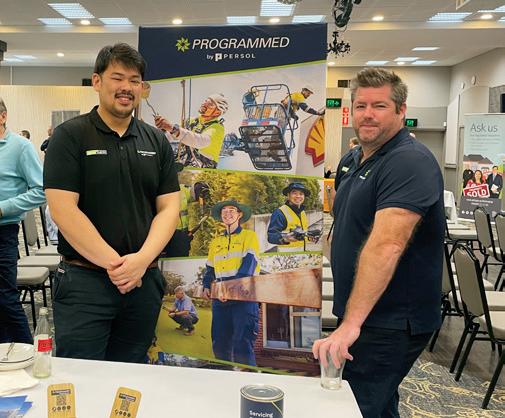
When: September 12, 2025
Where: The Star Brisbane
The ARAMA TOP Awards are an important opportunity to acknowledge the hardworking professionals in our community. Whether you can attend the dinner or not, we encourage all members to get involved in the nomination and voting process. Your voice matters!




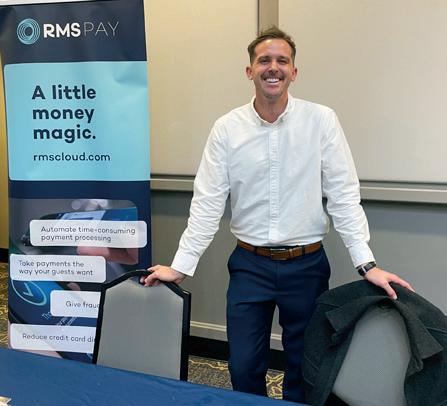
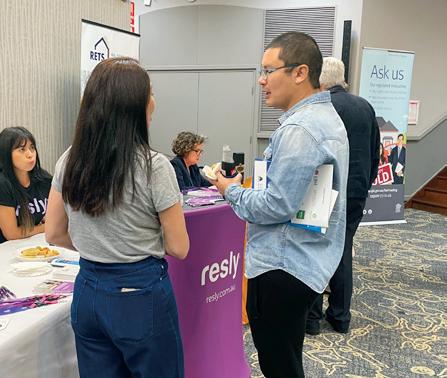
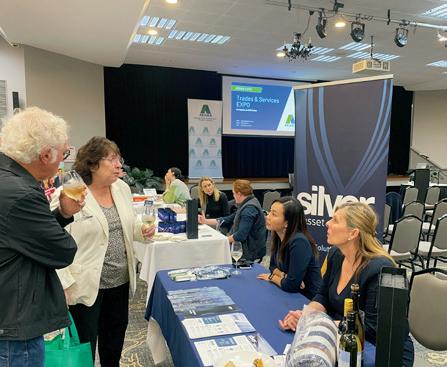

Join us in celebrating the best in tourism, Resly style.
• Business of the Year • Female Leader • One to Watch • Industry Ally • Community Spirit • Innovation
• Manager of the Year
Have your say, nominate for the best in tourism and accommodation by August 30.
Event Date: Friday, October 10, 2025
Venue: Grand Ballroom, The Star Casino, Broadbeach
Theme: Safari Luxe–think glamorous adventure with earthy tones, bold prints and wild elegance.
For more information, visit thebestofawards.com.au
Tickets are available now
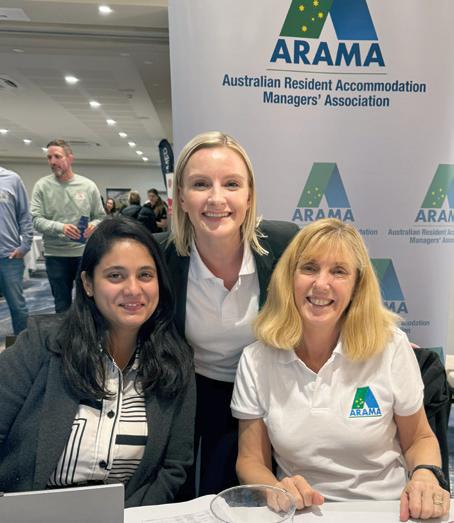
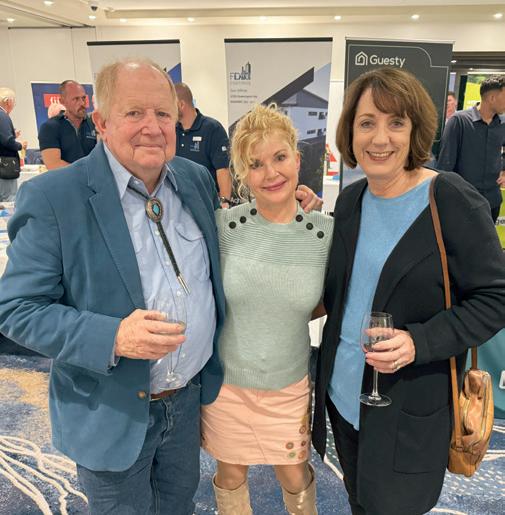



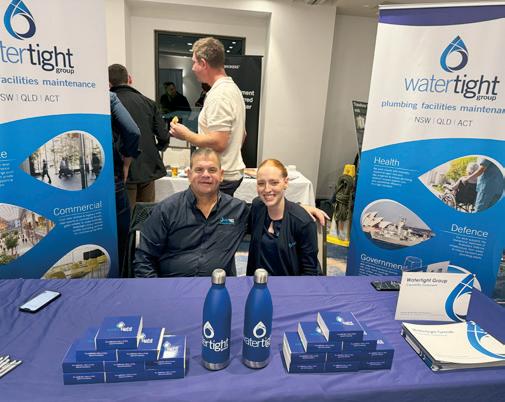
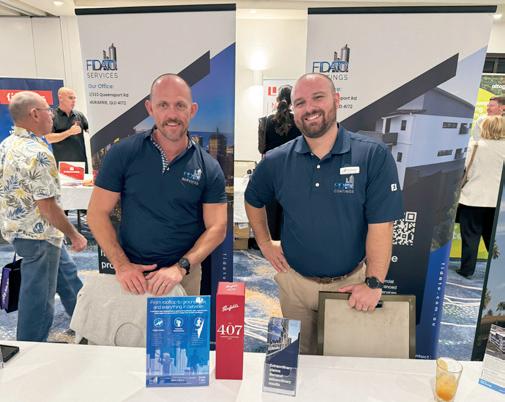

Sunshine Coast Roadshow
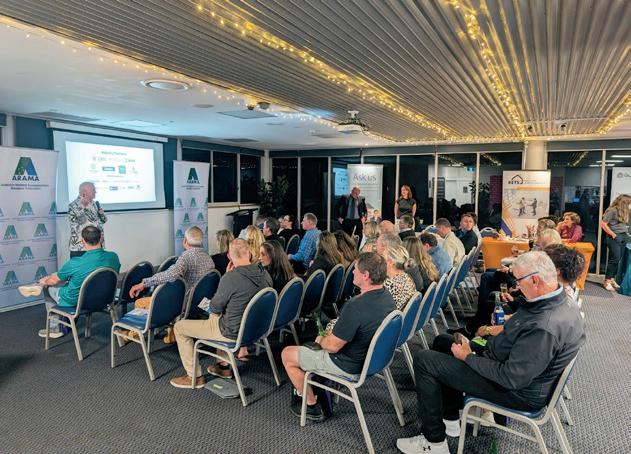

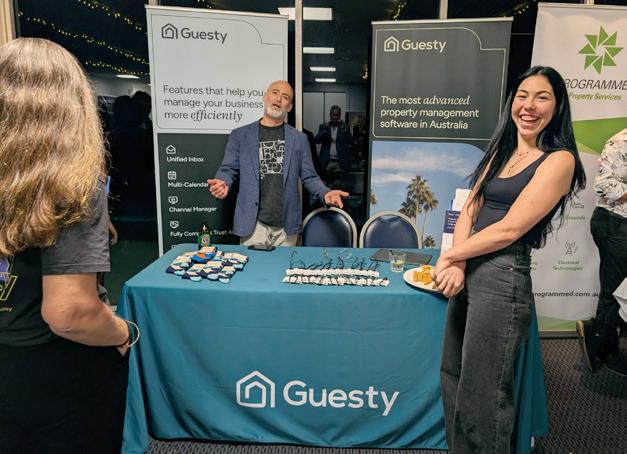

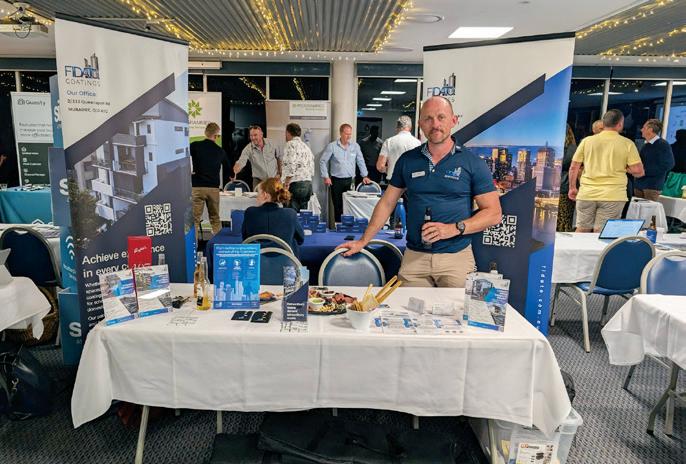
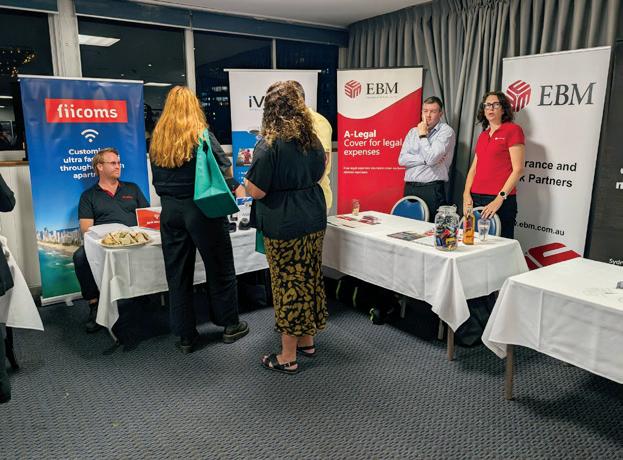
Brisbane Luncheon:
Date: Friday August 22, 2025. Time: 12 pm to 4 pm.
Venue: Portside Social, 37c Harbour Road, Portside Wharf, Hamilton, Brisbane.
Cost: Canapés lunch – $60 per person.
Sponsored by: OPAT
Join Women In at the August luncheon, proudly sponsored by OPAT. Enjoy an afternoon of networking, industry conversation and delicious canapés in a relaxed riverside setting.


AccomNews is heading to NoVacancy Hotel + Accommodation Industry Expo 2025, and editor Mandy Clarke wants to hear your story
Mandy will be hosting quick “Meet the Editor” sessions throughout the event. Whether you’re a supplier, operator or innovator, this is your chance to connect directly with the editor of one of Australia’s leading industry publications.
Book your spot via the NoVacancy 2025 app or email Mandy directly.




Let’s talk shop — and put your business in the spotlight! !

























With the accommodation sector navigating rapid transformation, from technology automation to sustainability and workforce challenges, NoVacancy 2025 arrives at a pivotal moment.
As Australia’s leading hotel and accommodation industry trade show, NoVacancy 2025 will once again bring together the brightest minds, most innovative solutions, and latest technologies that are shaping the future of the hotel and accommodation industry.
This highly anticipated event is the ultimate destination for hoteliers, accommodation providers, and short-stay operators looking to elevate their business, grow their networks, and stay ahead of a rapidly evolving industry.
“NoVacancy 2025 is more than an event; it’s where the future of our industry takes shape,” says Matthew Gatfield, Event Director “With guest expectations evolving rapidly and innovations like AI, automation and sustainability reshaping how
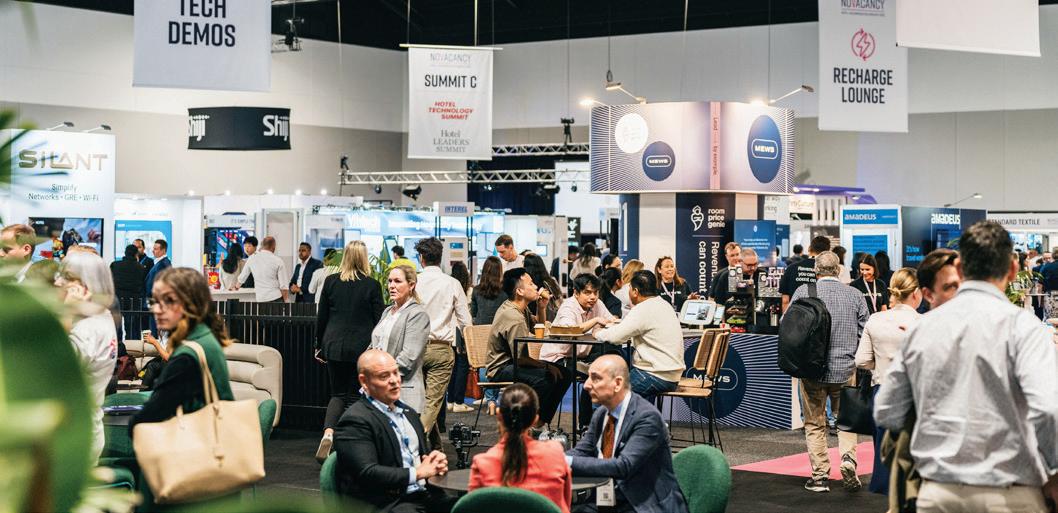
we operate, this year’s show is designed to equip the industry for what comes next. We have curated a high-impact programme filled with cutt ingedge technology, bold thinking, the kind of connections that drive real business outcomes.
“Whether you manage a boutique property, lead a resort or support accommodation businesses through services or tech, NoVacancy is where forward thinking professionals come to get ahead.”
Returning exhibitor, Matt Ford, IKEA for Business Leader at IKEA, said: “An excellent event that brought suppliers and decision-makers in the hospitality industry together.
It generated many high-quality leads, and the presentations were both informative and highly relevant to the current Australian market.”
James Goodwin, Chief Executive Officer at Accommodation Australia said: “People can’t miss NoVacancy, because there are so many people in one spot that you can talk to, you can learn from. There really is a buzz about the place, there’s an atmosphere.”
Back by popular demand, the NoVacancy conference program returns with nine targeted, expertly curated summits.
This year, we’re proud to bring back our full lineup of summits, each designed to address the evolving needs and priorities of the hotel and accommodation sector:
• Hotel Leaders Summit
• Revenue & Distribution Summit
• Hotel Sustainability Summit
• Hotel Technology Summit
• People & Culture Summit
• Future Leaders Summit
• Hotel Marketing Summit
• Small Hotelier Summit
• Design Talks
Registration is completely free. However, places at key networking events and summits are limited and fill quickly. Secure your spot early to make the most of your NoVacancy 2025 experience.
NoVacancy 2025 introduces fresh ideas, immersive experiences, and interactive spaces designed to spark inspiration and build lasting connections:
Meet 300+ brands: From sourcing new products to exploring industry trends and experiencing live demos, this is your chance to connect with exhibitors showcasing the latest tools, tech and services

The Accommodation Industry Golf Club teed off in style for Round Two of the 2025 Golf Series at the prestigious RACV Royal Pines Resort on Thursday, July 3.
Under clear blue skies, players enjoyed a spectacular day on the green, soaking up the sunshine and camaraderie that make these events a firm favourite in the industry calendar.
Adding an exciting new twist to the day, Ladbrokes came on board as a first-time sponsor. Their
nearest to the pin competition generated plenty of buzz, with the winner receiving four corporate passes to an upcoming Doomben or Eagle Farm race meeting.
Results from Round Two–RACV Royal Pines Resort
Larry Maloney Memorial Club Champion: Trent Fowler— 39 c/b (H’Cap 6)
A Grade Winner: Nathan Eades—39 c/b (H’Cap 9)
B Grade Winner: Tony Bull—39 c/b (H’Cap 18)
C Grade Winner: Dennis MacKenzie—35 (H’Cap 27)
designed to elevate your hotel operations and guest experience - all in one place.
Women in Accommodation Breakfast: This event provides a platform for women as leaders to share their insights, experiences and strategies for success.
Design Talks: Reimagined and Expanded: Design Talks unites leading architects, designers and project visionaries to explore the future of hospitality and commercial interiors.
Hotel Tech Talks: Experience live demonstrations of cutt ing-edge technology, automation, and AIpowered solutions that can transform your hotel and accommodation operations.
NEW: Start-Up Zone: Explore emerging hospitality start-ups, discover fresh ideas, connect with innovative founders and uncover breakthrough solutions.
Amadeus Content Hub: Across two days, enjoy fastpaced 20-minute sessions on the latest soft ware, innovations and trends.
LIVE Podcast Sessions at NoVacancy Expo: Join us for a ‘Room with a View’ podcast at

NoVacancy, hosted by Scott Boyes and Grant Alchin of Trilogy Hotels.
Event App & Networking @ NoVacancy: Enhance your NoVacancy 2025 experience by downloading the event app ahead of time. Explore exhibitors, view the agenda, plan your schedule and send meeting requests before you arrive.
NoVacancy 2025 features a stellar lineup of speakers, including CEOs, innovators, and respected experts who are redefining the hospitality landscape.
From high-level strategy to hands-on case studies, this

from the
Congratulations to all the winners and competitors who made the day memorable.
In a fitting finish to the round, Ladbrokes also hosted a putting competition, handing each player a distinctive red ball.
Anyone who managed to sink the putt would win $1000 on the spot—unfortunately, no one managed the feat, but in true Ladbrokes spirit, the prize money was instead placed on the bar for all to enjoy.
is your chance to learn from those leading the way.
2025 speakers include:
• Tash Tobias, CEO, Salter Brothers Hospitality
• Sarah Derry, CEO, Sarah Derry
• Tracey Wiles, Principal & Regional Interior Design Leader, Woods Bagot
• Cameron Burke, Director of Development (Australasia & Pacific)
IHG—Intercontinental Hotels Group
• James Goodwin, Chief Executive, Accommodation Australia
Whether you operate a boutique hotel, manage a resort, lead a short-stay group,
Ladbrokes will also sponsor Round Four, set for October at Oxley Golf Club.
Round Three of the 2025 Accommodation Industry Golf Series will be held at Maroochy River Golf Club on Friday August 15, with a midday shotgun start.
The round will be played in a Texas Scramble format, with rules to be provided on the day. All the regular on-course competitions will return, including pin competitions, longest drive, and sponsored golf holes.
The $120 player entry includes:
• Golf fees and shared cart.
• Over 300 leading exhibitors and 500 brands
• More than 80 free educational sessions
• Nine targeted industry summits
• Over 6000 accommodation professionals
• Two days of immersive content, networking and innovation
• And so much more!
or support accommodation businesses through services or technology, NoVacancy 2025 is where ideas spark action, and business gets done.
The show not only supports thousands of operators but also fuels the wider visitor economy through innovation, employment and industry growth.
Register FREE Below.
• On-course drink & sandwich.
• Giveaways and a wide range of prizes.
• Post-game burger meal.
Ladies are very welcome to participate.
Players who had previously booked for the postponed event may have their registration transferred to the new date— confirmation is simply required.
Sincere thanks go to the generous sponsors, whose continued support makes these enjoyable and affordable golf days possible for the industry.
All are encouraged to secure their place for another enjoyable day of competition and camaraderie.
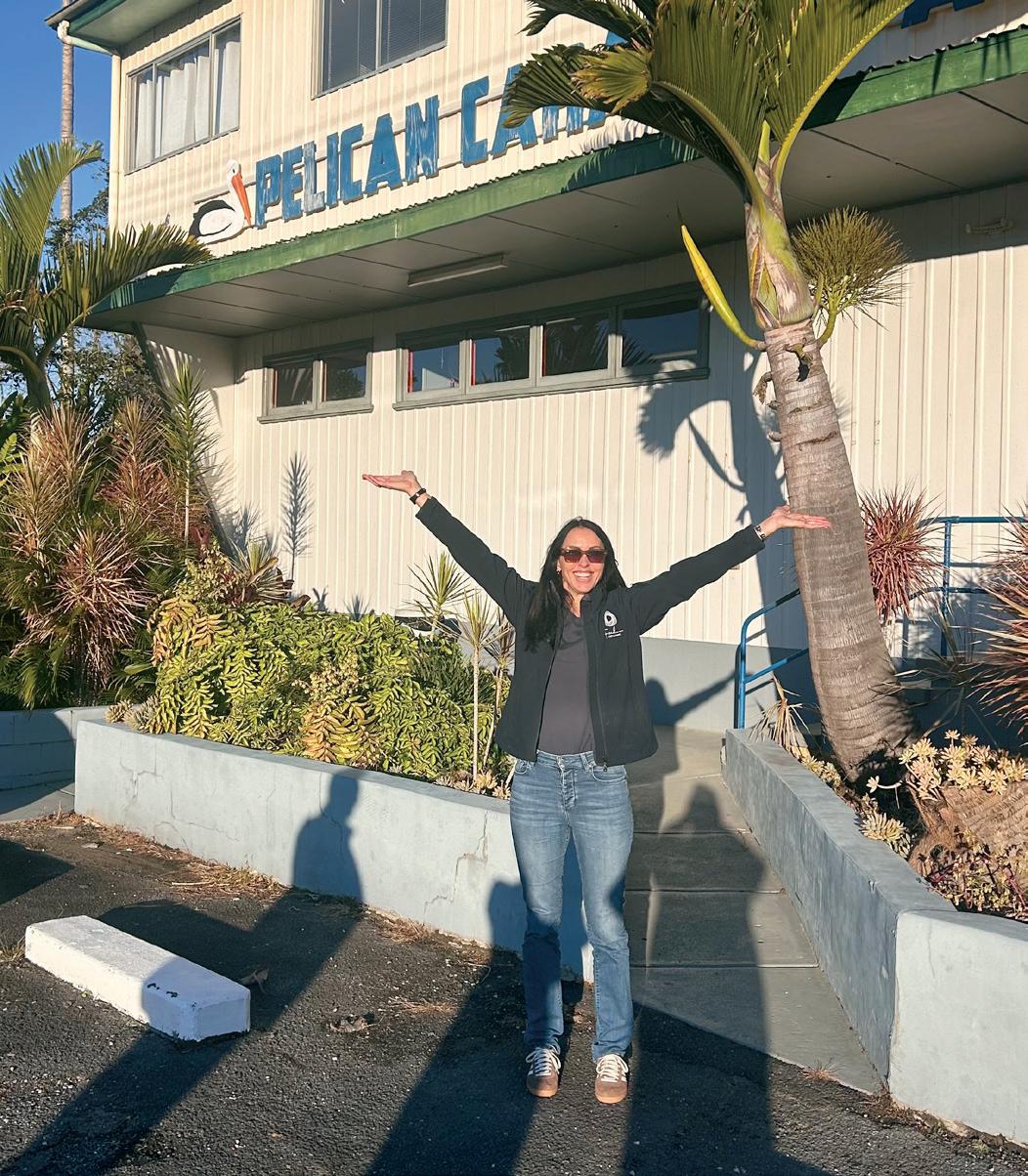
ResortBrokers’ Sunshine Coast Broker Chenoa Daniel has sold the management rights to holiday apartment complexes Marine Apartments, Sway Birtinya and The Curl.
Sold for Andrew O’Connor of MAP Property Solutions Pty Ltd, the three business-only management rights were purchased by experienced operators Zsofi and Craig Popplewell who previously operated the 40-apartment, four-star Glen Eden Beach Resort at Peregian Beach. All three properties are located in Sunshine Coast
hotspots: the 74-apartment Marine Apartments is on Kawana Island, the 60-apartment Sway Birtinya is in Birtinya, and the 30-apartment The Curl is in Bokarina.
“It’s a great example of what can be achieved through strategic acquisition in the management rights space,” says Chenoa Daniel, who has represented ResortBrokers on the Sunshine Coast since 2020.
“Together, there are 164 apartments across three properties. The buyers purchased these impressive business-only assets to combine them into a single, highly profi table enterprise.”

recognition for your hard work (and that of your sta )
✓ Lift the awareness of your property within the industry
✓ Help build relationships with other managers




✓ Lift the profile of your property for when you are ready to sell WHAT DOES IT COST TO HAVE AN INDUSTRY PROFILE?

It doesn't cost anything to have a profile in Resort News apart from a little time when helping to coordinate the profile material. WHO WRITES THE ARTICLE? The article will be written by one of our qualified











Hotel Resort Sales is excited to announce the successful completion of a major transaction involving the combined sale of three premier management rights businesses in Brisbane to Meriton Group. Acquired from Aurora Assets Management Group, the properties include Newstead Towers, Broadway on Ann, and Aqua Newstead comprising of over 710 lots.
This multi-million-dollar deal represents a significant milestone in Brisbane’s rapidly growing accommodation sector and marks Meriton’s first acquisition in the management rights space in Queensland. The landmark transaction underscores Hotel Resort Sales’ expertise in
“This transaction highlights the ongoing strength of Brisbane’s management rights market and the confidence that toptier investors have in its long-term growth.”
connecting leading operators with premium management rights opportunities.
The properties, situated side by side in sought-after innercity Brisbane CBD, off er strong investment potential and align with Meriton Group’s strategic expansion in the region.
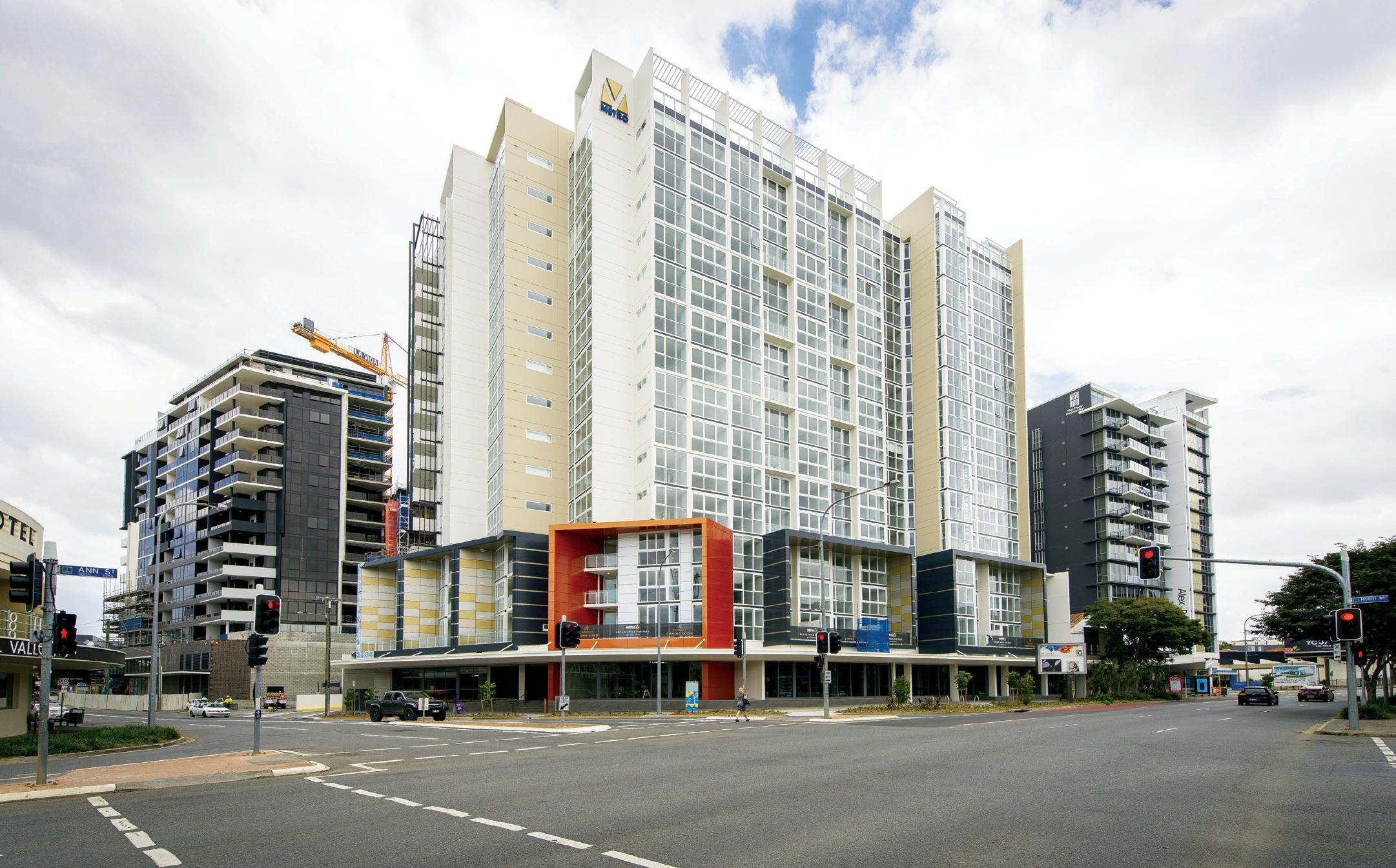

“This transaction highlights the ongoing strength of Brisbane’s management rights market and the confidence that top-tier investors have in its long-term growth,” said Craig Johnson, owner at Hotel Resort Sales.
“We are proud to have facilitated this deal and look forward to continuing our
Looking
role as a trusted leader in the management rights industry throughout Queensland.”
Jon Elliot, Head of Operations at Meriton affirmed "These assets are a strong strategic fi t for our portfolio, and we look forward to delivering long-term value for investors and residents. We’re actively
looking for similar quality opportunities in Sydney, Brisbane and The Gold Coast."
For 60 years, Meriton has grown to become Australia’s largest and most successful residential developer, having built, sold, leased, and managed more than 77,000 residential apartments and
mixed-use precincts across Sydney, Melbourne, Canberra, Brisbane, and the Gold Coast.
Hotel Resort Sales remains committed to delivering exceptional brokerage services, leveraging deep market knowledge to connect buyers and sellers for optimal outcomes.
to buy or sell a management rights business? Trust the experts.


At Hotel Resort Sales, we specialise exclusively in management rights sales. With years of industry experience, we know what it takes to achieve premium results. Whether you're selling a single complex or acquiring a large portfolio call us today to have a chat.
Proven track record in permanent, holiday, and mixed-use management rights, in-depth market knowledge and personalised service. Strong network of qualified buyers and industry professionals. Confidential, strategic, and results-driven approach.
When you're entering the industry or ready to sell, Hotel Resort Sales is the partner you can rely on.



















Forster NSW
Holiday Management Rights
Asking Price: $2 ,640,000
Net Profit: $441,849
Michael Philpott 0433 137 927
ID: 9118




Highland Park QLD


Kings Beach QLD
ID: 9203
Exclusive | Holiday Management Rights
Asking Price: $1, 225,000
Net Profit: $167, 208
Meagan Monk 0459 693 160

ID: 9189
Permanent Management Rights
Asking Price: $1,150,000
Net Profit: $129, 279
Phil Trimble 0418 478 966


Southpor t QLD

ID: 8538
Permanent Management Rights
Asking Price: $1,100,000
Net Profit: $87,331
Bill He 0439 288 960







Contact: Scott Saunders, 0432 144 822 scott@premiersales.com.au

Contact: Chris Cameron, 0408 192 490 chris@offmarkethotels.com.au

Ronnie Slebos, 0414 964


Contact: Michael Philpott, 0433 137 927 michaelphilpott@mrsales.com.au

Contact: David Jiang, 0481 500 278 davidjianghui@nextrealty.com.au



By Mandy Clarke, Editor
When Michelle Mathews and Leon Piasecki decided to trade their familiar lives for a complete lifestyle transformation, they didn’t just move towns. They changed industries, shifted careers and embraced the challenges of managing a tropical resort seven days a week.
Today, they are the new managers of Mission Reef Resort, a peaceful coastal retreat located in Wongaling Beach, part of Queensland’s spectacular Cassowary Coast near Mission Beach. Surrounded by tropical rainforest and just a short stroll to the ocean, the resort blends comfort, convenience and aff ordability, off ering a relaxing base for travellers exploring one of Australia’s most picturesque regions.
Their entry into the management rights industry wasn’t part of a lifelong plan. It started with a holiday.
Michelle, a former medicalsurgical nurse from Kingaroy, and Leon, a ceramic tiler and business owner from
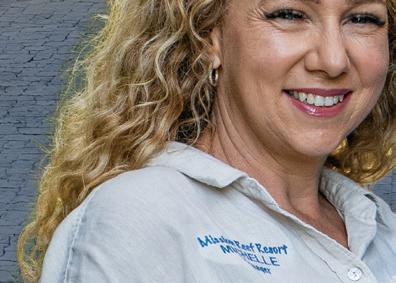















Take the leap and make sure you enjoy working together
Redcliff e, had been quietly dreaming of a lifestyle change. That dream turned into action during a spontaneous holiday to Mission Beach.
“We were inspired by a good mate who had been in management rights for years,” Leon said. “Then, while on holiday, we stumbled across Mission Reef Resort.
It happened to be on the market, and it just clicked.”
The seed had been planted long before, with both Michelle and Leon craving a change. With support from the experts at Mike Phipps Finance and the specialised accounting team at Caatz, the couple began the purchase journey.
“The team at Mike Phipps Finance was fantastic, walking us through every step; nothing was ever too much trouble,” Michelle said. “And the team at Caatz were equally brilliant. Their industry knowledge and guidance gave us a lot of confidence as first-time buyers.”
After fi ve months, Michelle and Leon officially took over the resort on February 26, 2025, exactly seven years to the day since the previous owners began their chapter.
Built in 2005, Mission Reef Resort off ers 15 self-contained two-bedroom apartments, 13 of which are currently in the lett ing pool. Each apartment is bright and spacious and can be split into dual-key motel-style accommodation, making the resort flexible for a wide range of guest types. The property features a large outdoor pool surrounded by tropical gardens, a shaded barbecue area, spa facilities and convenient onsite parking. Guests often comment on the resort’s peaceful atmosphere, easy beach access and generous apartment layouts, many with balconies overlooking the lush, landscaped grounds.
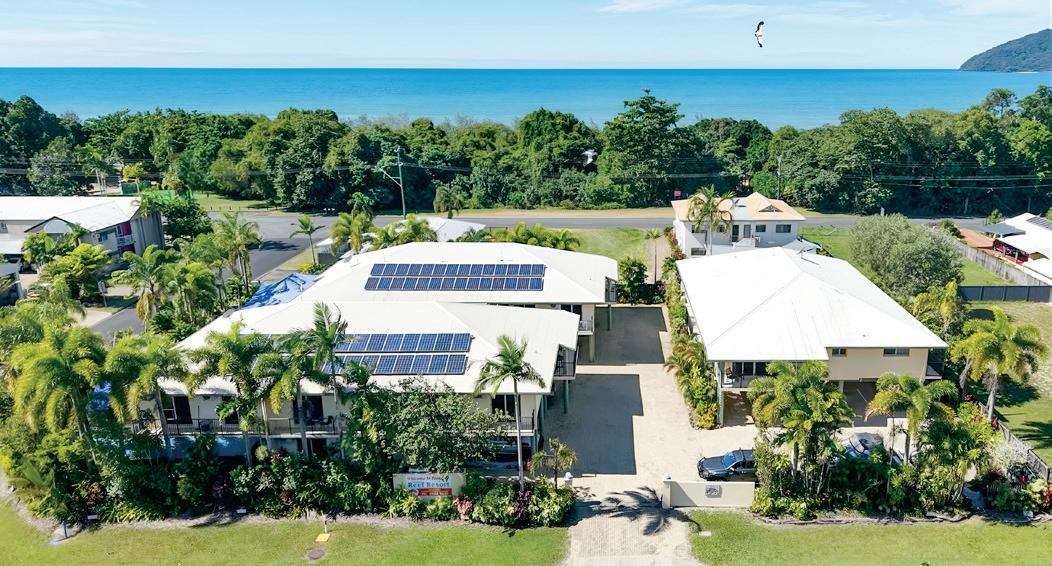
From short-stay couples to families, university student groups and adventure-seeking tour travellers, the resort appeals to a variety of guests looking for value, comfort and proximity to Mission Beach’s main att ractions. It is also a popular choice for international holidaymakers and repeat interstate visitors, as it is just a two-hour drive from Cairns Airport.
From day one, Michelle and Leon rolled up their sleeves. They reorganised the office, installed new air conditioning, refreshed interiors and tackled practical repairs including fencing and landscaping. They also adjusted pricing, improved
communication and boosted direct phone bookings.
“We have focused on improving everything we could, from internal systems to how we connect with guests,” Michelle said. “We want every visitor to feel welcome and every owner to see solid returns.”
Their proactive approach is already paying off. One couple staying at the resort encountered a broken washing machine. Before they returned from the beach, Leon had personally taken care of their laundry. It is this kind of extramile service that is earning the couple positive reviews and building strong word of mouth.
“The owners are happy with the improvements and their


returns,” Michelle said. “We’re here every day, listening to guests and making sure everyone feels welcome.”
Though new to the industry, Michelle and Leon are eager to learn. They are now proud members of the Australian Resident Accommodation Managers Association (ARAMA).
“As new managers, being part of ARAMA will help us stay informed, supported and connected,” Michelle said. They have also built strong relationships with their body corporate committee and unit owners. Transparency, consistent communication and
noticeable returns have helped cement trust and rapport in the short time since they took over.
Leon, originally from Far North Queensland, is right at home in the tropics. The couple have embraced the coastal lifestyle with enthusiasm. Leon spends his downtime fishing in his boat, and both hit the gym before diving into their daily tasks.
“We love it here,” Michelle said. “The pace, the people, the weather—it’s exactly what we were looking for.” They manage all day-to-day operations themselves, supported by a small team of contract cleaners during peak periods.









They also rely on a local couple for occasional relief management. The guest mix is wonderfully diverse, with recent visitors including university groups from the United States and travellers from Intrepid Travel.























Located just two hours from Cairns Airport and a short stroll from the beach, the resort continues to earn praise for its peaceful sett ing, generous self-contained apartments and friendly service.
In the short term, Michelle and Leon are focused on strengthening systems, refining guest services and experiences and delivering consistent value for owners.
They also have sustainability in their sights, with solar panels already in place and practices like recycling and waterwise education promoted throughout the resort.
to making Mission Reef Resort the very best it can be.
“To anyone considering this industry, be patient, take the leap and make sure you enjoy working together,” Leon said. “It’s not nine to fi ve, but it’s incredibly rewarding.”
And if they could spend one day as guests?
“We’d lie by the pool and try our best to do absolutely nothing,” they laughed.
With warmth, energy and a genuine love for their new lifestyle, Michelle and Leon are proving that fresh eyes and a positive mindset can bring exciting success in the management rights world.
Their story is a reminder that with the right support, transferable skills and a hands-on approach, anything is possible.




Long term, the couple hope to travel around Australia, but for now, their energy is devoted
Welcome to the management rights community, Michelle and Leon. We look forward to seeing what you achieve next.



































































